AUDIT AT THE CROSSROADS
No one it appears, neither current audit professionals nor prospective entrants, sees audit being a proper career choice unless they can achieve a work-life balance, are paid proper money and work in a supportive environment.
Audit professionals also want to see transparent career pathways and inclusive work environments.
Hardly surprising then that many young audit professionals plan to leave their current employer either within the next 12 months or within a few years.
A new extensive study by ACCA and the Chartered Accountants Australia and New Zealand found audit at a pivotal junction, with professionals expressing concerns about both a lack of career satisfaction and the prevailing practices currently found in audit firms.
It is achieving a work-life balance that mattered most. Survey respondents suggested that there


was also an urgent need to address at times unsupportive cultures within firms, which can impair wellbeing and work-life balance.
The study said firms may be taking steps to address these problems, but their initiatives may lack ‘visibility’.
Remuneration ranked as the
second-most important factor in the study, reducing the attraction and retention of talent in the audit profession in most regions.
Auditors felt that the intensive workload during busy seasons was not adequately compensated for. This was in turn demotivating, and if it remains unchecked could further
impact the attraction and retention of talent in the future.
And, as the authors of the report said, pay will always be considered inadequate if the impact of a poor work-life balance is not addressed.
There is also a perception of a lack of variety of work for auditors. The rise in regulatory requirements and standards has heightened the demands of the job, often causing audits to feel more like a compliance exercise rather than a value-adding service.
However, the authors of the study said the interest in sustainability reporting and assurance presents opportunities to attract, develop and retain staff.
Technology can also play a part in attracting people to the profession. Survey findings reveal a strong interest in advanced technologies among individuals considering entry into the audit profession.
Read the full report at https://tinyurl.com/57fsscm2
TOO ANXIOUS TO TAKE YOUR ANNUAL LEAVE?
Women working in the accountancy sector may not be getting enough time off work to recharge and relax, with new research from caba showing that over a third of female accountants (41%) say they’ve avoided taking annual leave on more than one occasion because they were anxious about handing over their to-do list.
The study of over 200 female chartered accountants in the UK found that almost nine in 10 (88%) women regularly sacrifice their own work-life balance to accommodate the needs of others.

A similar percentage (85%) said they struggle to set boundaries with colleagues and their manager regarding their time, workload or personal priorities. When asked why this is, two in five (40%) said that keeping people happy is more important. Over one in three (36%) said they worry they’re not deserving of their place at the company if they don’t push themselves.
Meanwhile, almost two in three (62%) respondents said they regularly experience

feelings of self-doubt regarding their abilities within their role. As a result, one in eight (80%) said they find themselves seeking validation from others for their work or decisions.
Two in five (40%) said they’re uncomfortable telling their manager about areas they feel less confident in, while four in five (80%) said they often feel like they need to work harder than their peers to prove their worth.
When respondents were asked about which strategies and resources they think would be helpful in combatting feelings of work-related self-doubt, the most common responses were flexible working arrangements (34%), regular feedback and recognition from their manager
Continued on page 5

Incorporating NQ magazine May 2024 w.pqjobs.co.uk FINALISTSAWARDS INSIDE
Advance your career with a Mindful Education course or apprenticeship Discover more at mindful-education.co.uk/learners







BOOK NOW at IFA.ORG.UK/AMLCONFERENCE24 PRICES IFAMember&affiliate£65 IFADirectstudent £40 Non-member £90 6.5 CPD HOURS TUESDAY 21 MAY | 9:30AM TO 4:00PM AML Conference Online 2024 @INSTITUTEFA INSTITUTE OF FINANCIAL ACCOUNTANTS INSTITUTEOFFINANCIALACCOUNTANTS INSTITUTEFA Gain valuable insights from experts about AML regulatory updates and how best practice can protect your business from being misused for the purposes of criminal activity. The role of the MLRO Richard Simms, Managing Director AMLCC What to expect in an AML review IFA AML Review team Bringing SARs to life Emma-Jayne Turner, Manager - Reporter Engagement, UKFIU, National Crime Agency “All too familiar” video and discussion Tim Pinkney, IFA Director of Professional Standards and Ian Hornsey, IFA Director and Regional Ambassador
IN THIS ISSUE

Our 21st PQ magazine awards night is here! The shortlist can be found on page 16, and there are lots of shining PQ trophies looking for a new home. Make sure you follow all the fun on 22 April. I can promise our finalists and guests are going to be wowed by this year’s venue – Lio London.
I don’t have a vote for our awards – independent judges do all that – so it was great to be a judge for the AAT Training Provider awards. After a four-year absence it was nice to see everyone in Nottingham enjoying themselves, and I even got to say hello to my old friend Paul Sizer from Gower College. A perfect night then.
Our YouTube video of Lord Sikka talking about the Post Office Scandal has really taken off. Some 5,000 people have already watched it, and it makes for great viewing. Check it out at https://youtu.be/ jkCWvJt0l6A.
We will have a podcast of our ‘No accounting 4 the love of football’ ready for you next month. We got a great turnout at the Crypt on the Green, and big thank you goes to CASSL, ACCA, ICAEW and HMRC Enquires, Investigations & Powers magazine for supporting that one.
Keep reading, and we will keep trying to create content you want to read and things you want to listen to!
Graham Hambly, Editor and Publisher, PQ magazine
Features, etc
14 Have your say
Lord Sikka is right to question role of Post Office accountants – and your responses to his YouTube video. Plus our social media round-up
16 PQ Awards 2024
The red carpet is being rolled out for all the finalists for the PQ magazine awards night. Who made it onto our shortlist this year?
18 New ICAS syllabus
ICAS explains what the new syllabus will look like and how it is changing the way students learn
19 ACCA podcasts
Association launches podcast series designed to help its PQs deal with the common issues confronting them
21 AAT Training Provider conference special
Four pages of conference news and pix, kicking off with advice about improving your writing skills. Plus all the winners at the association’s awards; and we profile a special student with an inspiring story
26 IFA spotlight
5
6
12 Tech news Apple sued over ‘monopolisation’ of US


34 CIPFA spotlight
Local authorities struggle to balance the books as funding pressures increase and demand for services grows
35 Careers
Sorry may no longer be the hardest word; our Agony Aunt tackles your career queries; and our Book Club review
36 Fun
The lighter side of life – and accountancy
The columnists
Have you got fit-for-purpose anti money laundering safeguards in place?
27 AAT exams
Budgeting and variances explained
29 A question for Tom Tom Clendon explains the difference between a subsidiary and an associate – it’s all about control
30 CIMA pre-seen Saddle up for the latest OCS preseen exam
31 ACCA AFM exam
How to pick up the easy marks in the discussion part of the AFM exam
32 CIMA spotlight
How to gain understanding of the subjects that, initially cause you real a headache
Lisa Nelson How to lose that fixed mindset
Robert Bruce How diversity shapes UK auditing
Prem Sikka State getting new powers to spy on you
Anna Kate Phelan AppIe’s US case is one worth watching
Eddie Herbert Helping organisations achieve SBI targets
4
6


News
Equality, diversity and inclusion
EDI policies now becoming ‘tick box’ exercises?
4
Are
PQ Awards 2024 The short list is out now!
STEAM, perhaps?
Accountancy and STEM CIMA backs MPs’ call to make accounting a STEM subject.
Small businesses to benefit from increased apprentice funding
FRC updates standards Watchdog issues ‘comprehensive improvements’ to FRS 102
8 Apprenticeship reform
10
smartphone market
8
10
12
subscribe for FREE go to www.pqmagazine.com
To
May 2024
A note
contents p18 p22 PQ Time to outsource your payroll A fully comprehensive professional payroll service offered for a very low monthly fee. My services will free valuable time to enable you to concentrate on other matters. Call Emma now for full details on 020 8803 6834/07889 885646 or email her at emmaarif@absaccounts-payroll.co.uk
from the Editor
LISA NELSON

I
don't understand this – yet!
Carol Dweck’s concept of a ‘growth mindset’ has changed the way many people think about themselves and their abilities.
At the heart of her idea lies the belief that abilities and intelligence can be developed through dedication and hard work. Dweck contrasts this with a ‘fixed mindset’, where individuals believe their abilities are innate and unchangeable. This idea alone is hugely motivational.
One of the pivotal terms Dweck uses is ‘yet’. This small word holds immense power in shifting perspective towards a growth mindset and away from a fixed one. When faced with a learning challenge you might find yourself saying, “I don’t understand this”, which of course may be true. However, adding the word ‘yet’ acknowledges the difficulty but expresses optimism that you will figure it out.
The inclusion of ‘yet’ is a catalyst for resilience and perseverance. It can encourage you to embrace challenges rather than shying away from them, understanding that they are only temporary setbacks that can be overcome. ‘Yet’ reframes failure as a stepping stone to success and supports the view that mistakes are valuable learning experiences rather than indicators of incompetence.
It is sometimes difficult when talking about these sorts of theories to leave people with a clear practical application, but this is an easy one: give it a go, unless of course you don’t believe me ‘yet’.
Lisa Nelson is Director of Learning at Kaplan
In brief
Watch Lord Sikka in action on YouTube
We have turned Lord Sikka’s talk on the Post Office scandal into a 26-minute YouTube video. Where were the accountants, he asks, and he believes there should be an inquiry into their role in the whole debacle.
PQ columnist Lord Sikka emphasises that the scandal shows technology does not solve many of our problems , and in fact may actually create more.
He feels accountants need to be
Time to go beyond the buzzwords
While equality, diversity and inclusion (EDI) initiatives are increasingly commonplace, there is growing scepticism among professionals that these have now become mere ‘tick-box’ exercises, bringing few tangible improvements.
The worry is that, as a result, support for EDI efforts seems to be on the wane.
Research by the Young Foundation, which included ACCA, CIPFA and ICAS among the 12 professional bodies who took part, found that navigating professional life clearly comes with challenges for the vast majority of professionals from minority backgrounds. Almost three-quarters of those surveyed said they had experienced barriers to progression in their
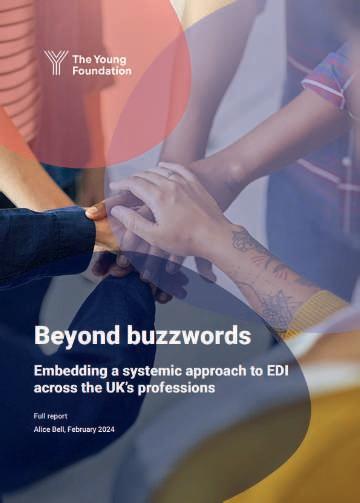
careers, and felt they had experienced discriminatory or exclusionary behaviour in the workplace.
In the report ‘Beyond the
Destructive times await!
The world is falling dangerously short of the ambition that is needed to secure a safe future climate, says Emma Cox, PwC UK’s Global Climate Leader.
Commenting on the WMO ‘State of the Global Climate in 2023’ report, she added that the world’s collective failure to get to grips with climate change leaves us on

the cusp of an unpredictable and economically destructive time.
Cox said: “We must now bend
buzzwords’, author Alice Bell said the findings contradict claims that professional experiences are rooted in a meritocracy. Researchers found access and entry routes into many professions remain challenging for people from minority backgrounds.
The implications of this uncomfortable reality must be taken seriously, said Bell, as more than half (53%) of professionals surveyed say they have considered leaving their employer or profession because of issues related to EDI. Most commonly, this is because they feel overlooked or undervalued, with further concerns around progression, management, workload, pay and culture. They also feel excluded from informal networks.
the curve on emissions growth and urgently seize the opportunity to realign our global economy and net zero pathway with a 1.5°C future climate.”
PwC’s latest Net Zero Economy Index shows that a year-on-year decarbonisation rate of 17.2% is now required to limit global warming to 1.5°C above preindustrial levels – seven times greater than what was achieved over the past year (2.5%).
UK and Australia sign audit agreement
The UK’s Financial Reporting Council (FRC) and the Australian Securities and Investment Commission (ASIC) have announced a Memorandum of Understanding on Reciprocal Arrangements (MOURA) making it easier for auditors to work between both countries.
The agreement allows auditors
ready to deal with these challenges – and should remember IT is not flawless and can never be a substitute for human assessment and judgement.
Check out his talk at: https://youtu.be/jkCWvJt0l6A
Are you ready for Accountex?
Accountex London is returning this Spring, on 15-16 May 2024.
London’s Excel is expected to welcome over 10,000 accounting and finance professionals through
who have obtained professional audit qualifications as a statutory auditor in either the UK or Australia to more easily apply for recognition of their qualification and audit rights in the other nation.
FRC said this latest move will improve the quality of the UK audit market by increasing the number of skilled statutory aud-
its doors. The education programme offers up to 16 hours of free CPD, and will be held across 13 theatres and 250-plus sessions.
Among the speakers are former Chancellor of the Edxchequer Lord Hammond, who will be looking at what the future looks like for the UK economy and public finances. On his list is the part the tax system can play in delivering the solutions.
Mhari Aitken, ethics fellow at the Alan Turing Institute, will be
itors able to practise in the UK over time and make it easier for UK audit firms to export their services to Australia.
Similar audit arrangements have recently been signed with New Zealand and Switzerland, and the FRC is continuing to explore other agreements subject to rigorous qualification standards being met.
addressing the real risks of AI in her session.
PQ magazine is a partner of Accountex.
Great leap forward
ICAS believes its new syllabus and new way of learning represent the biggest shake-up in how it trains its students in its 170-year history.
ICAS CEO Bruce Cartwright explained that ICAS has constantly reinvented itself to remain relevant. See page 18 for more.
PQ the PQ Magazine May 2024 4
The finalist are…
Lio London, next to Leicester Square in the heart of the West End, is rolling out the red carpet for the 21st PQ magazine awards on 22 April.
But who are our finalists, we hear you cry. Well, they can all be found on page 16 of this issue.
As always the shortlist has some familiar and not-so-familiar faces on it. The town of Stockport will be well represented this year. Bee Motion (finalist in Best Use of Social Media) and Tim Mickleburgh (up for Graduate of

AAT scholarship still on offer
There is still time to grab an AAT scholarship, to help you get to the next level of your journey. PQ magazine and e-Careers have so far given away five sponsorships to AAT students. There is now one scholarship left to claim. To be in with a chance to win this last one you need to tell us why you should be awarded the free scholarship. Send your entry
to scholarships@e-careers.com, along with your full name and the level you want to study. You could be studying a whole level with nothing to pay!
Rebecca Guy, Jack Hancock, Khatra Ali and Hannah Walklett have already received their scholarship offers. And we have now notified our fifth recipient of their good news.

the Year) both hail from there. In a similar vein, Nottingham College and the Nottingham Chartered Accountant Students’ Society have also made the cut.
The awards will also have a real international flavour too, as one of the finalists for Lecturer of the Year, Ahmed Shafi, will be flying in from Pakistan.
It’s great too to see Bethany Duffy (pictured) on the NQ of the Year shortlist. She won PQ of the Year, but was unable to attend because she was in Australia. She promises she will be travelling down from Carlisle this year.
A special night is planned for all the winners and finalists.

Continued from page 1
(33%) and access to training and development programmes (30%).
Commenting on the findings, Ola Opoosun, Head of Support Services at caba, said: “The study findings show that there are still significant challenges for women working in the accountancy profession and that the industry still has some way to go if it’s to become a truly inclusive space for women. Many female chartered accountants are struggling with a lack of confidence in their role and this, in addition to other factors such as gender bias and a lack of representation at a senior level, is stopping them from reaching their full potential.
“We urge employers to reflect on the strategies and resources highlighted by many of the women who participated in our study and ensure that they’re doing everything they can to support and empower their female employees.”
As part of its ongoing commitment to the welfare of the ICAEW community, caba has launched its new Women in Accounting Hub, a dedicated online space where female ICAEW members can find support, development courses and other helpful resources.


PQ 5 PQ Magazine May 2024 PQ news
ROBERT BRUCE Profession must embrace all sorts

Many think accountants are the same the world over. But in fact they are not, far from it. Take the US accounting profession. Accountants in the US are very different from those in the UK, and it is down to the culture that shapes them.
In the UK people come into accounting from a range of disciplines. Imagine what it would be like if the only people who could become accountants were people with accounting degrees. It would, I suggest, tend to be a much duller world, and it wouldn’t necessarily attract the brightest and the best. They are not going to be people who always have brains that are bulging with ideas and the excitement of youth. But that is what happens in the US. You want to be an accountant? You have to have done a degree in accounting.
Raymond Chandler, writer and creator of the private eye Philip Marlowe some 70 or so years ago, started life as a bookkeeper. If such people cropped up in his books they were orderly folk amidst the gangster mayhem, wearing a row of different coloured pens in their breast pocket. Culture makes all the difference. And it is in the UK that accountants spread out all across the business disciplines. Small wonder that in a free-form world the UK profession is burgeoning and in the US it is dwindling.
Robert Bruce is an award-winning writer on accountancy for The Times
In brief
Time to swap planes for trains
BDO has told staff that they must swap planes for trains for shorthaul business trips so they can help the firm meet its net zero targets.
It is also telling workers to fly economy for journeys under seven hours and is also encouraging them to opt for premium economy class over business class on all longer flights.
BDO also wants everyone to travel less, and try to have fewer
STEM definition needs updating
AICPA and CIMA says MPs are right to call for accounting to be considered a STEM (science, technology, engineering, maths) subject in the UK.
A report by the All-Party Parliamentary Group (APPG) on Accounting for Growth, which CIMA provides the secretariat for, found that including accounting in STEM would give the grouping a more commercial focus, and guide young people towards developing highend skills relevant to the modern workplace.
The report stresses that the understanding of what STEM is supposed to achieve would benefit from clarification, and the grouping would benefit from a stronger focus on its commercial application. If accounting were considered a STEM subject, it would raise the status of the profession and recognise the

vital contribution it makes to the functioning of modern organisations.
Andrew Harding, FCMA, CGMA, Chief Executive – Management Accounting at AICPA & CIMA, said: “We welcome this report, and I hope it stimulates further debate on designating accounting as a STEM subject. In recent years, accounting has developed many high-level technical aspects, including the
It should be the same
Why, asked top tutor Chris Cain (pictured), are ACCA students in exam halls treated differently to those sitting their exam at home?
He said students sitting their exams in an official exam hall get pen and

paper to write and plan their answers. However, those sitting online get nothing and are subject to very strict rules about everything – they can barely move during the exam.
He said it was time
Time to tax capital gains fairly
Capital gains should be taxed at the same rate as income, says accountant and academic Richard Murphy in his Taxing Wealth Report. He said the arguments are straight-forward – capital gains are profits that people make from selling land and buildings, or pieces of art, or stock and shares, or anything else of that sort, that by
staff travelling together on trips. The firm is aiming to become a fully net zero business by 2050, and has an aim of reducing its emissions from business travel by 49% by 20230.
Outstanding balances
ACCA has reminded students that now is the time to pay any outstanding balance on their account.
ACCA said it is not too late for you to continue your journey – you
and large, wealthy people own.
Murphy stressed: “I can’t see any reason why they should pay a lower rate of tax on the money that they make from this activity than you and I do on working for a living.”
He added: “It is also very costly. We could raise at least £12 billion of extra tax revenue a year if the rates were equalised.”
just need to remember to pay your annual subscription. If any student is having financial difficulties or need further help, they should contact ACCA direct.
Siblings made up movies for £1m tax fraud
Brothers who tried to steal £1 million in a ‘staggering and audaciously dishonest’ film tax fraud have been jailed for a total of 14 years.
Craig Rees, 50, and his 52-year-
use of data analytics and advanced forecasting tools. It is right that this technical component is recognised through the STEM designation.
“Young people choosing their career paths should fully understand that if they train as accountants, they will be using cutting-edge technology to influence organisational decision-making at the highest level.”
for a level playing field and for the ACCA to relax the rules on those sitting online at home. Let them have paper, he said.
Cain, an approved trainer at PwC Academy, and PQ magazine are planning to work together to provide ACCA SBL students with a free, pre-seen mock, which can be marked for a small fee (£25). There will be more on this in the next issue.

You can read the Taxing Wealth Report 2024 at https://taxingwealth.uk/ Watch his video at https://tinyurl.com/mr2b2atc
old brother Carl, submitted fraudulent Film Tax Relief (FTR) and VAT claims to HMRC. The pair submitted inflated or made-up claims to HMRC for three separate films: Whispers, The Eight, and Violence.
HMRC proved the pair’s claims were fraudulently inflated for the first film, which was moved to the United States. The second film was entirely made up, and the third movie was produced in the US purely to submit further fraudulent claims.
6 PQ the PQ Magazine May 2024
Richard Murphy
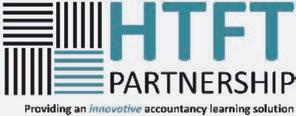
WŝĐŬ�,d&d ĨŽƌ� ��d�
tĞ�ŚĂǀĞ�Ă�ƌĂŶŐĞ�ŽĨ�ůŝǀĞ�ĐŽƵƌƐĞƐ�ĨŽƌ���d�>ĞǀĞů�ϯ�ĂŶĚ >ĞǀĞů�ϰ�ƵŶĚĞƌ�YϮϬϮϮ, ƚŽ�ĐŽŵƉůĞŵĞŶƚ�ŽƵƌ ŽŶ ĚĞŵĂŶĚ ŽƉƚŝŽŶƐ�Ăƚ�>Ϯ �>ϯ�ĂŶĚ�>ϰ �
,d&d ůŝǀĞ �ƉƌĞ ƌĞĐŽƌĚĞĚ�ƐLJůůĂďƵƐ�ǀŝĚĞŽƐ�ƚŚĂƚ�ůĞĂĚ�ŝŶƚŽ�ƐĐŚĞĚƵůĞĚ�ůŝǀĞ�ŽŶůŝŶĞ�ŝŶƚĞƌĂĐƚŝǀĞ� DĂƐƚĞƌĐůĂƐƐĞƐ�;ǁŝƚŚ�ĞdžƉĞƌƚ�ƚƵƚŽƌƐ �Ăůů�ĚĞƐŝŐŶĞĚ�ƚŽ�ƐƵƉƉŽƌƚ�LJŽƵƌ�ŵĂƐƚĞƌŝŶŐ�ŽĨ�ŬŶŽǁůĞĚŐĞ� ĂĐĐŽŵƉĂŶŝĞĚ�ǁŝƚŚ�ĐŽŵƉƵƚĞƌ�ďĂƐĞĚ�ƚĞƐƚƐ�ĂŶĚ�ŵŽĐŬ�ĞdžĂŵƐ� &Žƌ�ŵŽƌĞ�ŝŶĨŽƌŵĂƚŝŽŶ�ǀŝƐŝƚ�ǁǁǁ ŚƚĨƚƉĂƌƚŶĞƌƐŚŝƉ ĐŽ ƵŬ ĐŽƵƌƐĞƐ ĂĂƚ
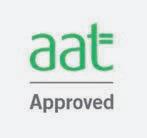

dŚŝŶŬ����� �ƚŚŝŶŬ�,d&d
tĞ�ŚĂǀĞ�Ă�ĨƵůů�ƐƵŝƚĞ�ŽĨ ������ƉƉůŝĞĚ�^ŬŝůůƐ�ĂŶĚ ^ƚƌĂƚĞŐŝĐ�WƌŽĨĞƐƐŝŽŶĂů�ĐŽƵƌƐĞƐ.
▪ DĞŵďĞƌƐŚŝƉ�ŽĨ�ŽƵƌ�ǀŝďƌĂŶƚ�KŶůŝŶĞ�>ĞĂƌŶŝŶŐ��ŽŵŵƵŶŝƚLJ �ĂŶĚ�ĂĐĐĞƐƐ�ƚŽ�Ă�ĚĞĚŝĐĂƚĞĚ�ƚƵƚŽƌ
▪ ,d&d�WĂƌƚŶĞƌƐŚŝƉ�ƐƚƵĚĞŶƚ�ŶŽƚĞƐ�ĂŶĚ������ĂƵƚŚŽƌŝƐĞĚ�ƐƚƵĚLJ�ƚĞdžƚ �ĞdžĂŵ�Ŭŝƚ�ĂŶĚ�ƉŽĐŬĞƚ�ŶŽƚĞƐ
▪ &Ƶůů�ƐLJůůĂďƵƐ �dŽƉŝĐ�ďLJ�dŽƉŝĐ�ƌĞĐŽƌĚŝŶŐƐ�ƐƵƉƉŽƌƚĞĚ�ďLJ�ƚŝŵĞƚĂďůĞĚ� ůŝǀĞ�ŽŶůŝŶĞ �dƵŝƚŝŽŶ�DĂƐƚĞƌĐůĂƐƐ�ƐĞƐƐŝŽŶƐ� ƌĞĐŽƌĚĞĚ �ĚŽǁŶůŽĂĚĂďůĞ�ĂŶĚ�ƉůĂLJĂďůĞ�ŽŶ�Ăůů�ĚĞǀŝĐĞƐ ▪ ^ĐŚĞĚƵůĞĚ� ůŝǀĞ�ŽŶůŝŶĞ � ZĞǀŝƐŝŽŶ�DĂƐƚĞƌĐůĂƐƐ�ƐĞƐƐŝŽŶƐ� �ƌĞĐŽƌĚĞĚ �ĚŽǁŶůŽĂĚĂďůĞ�ĂŶĚ�ƉůĂLJĂďůĞ�ŽŶ�Ăůů�ĚĞǀŝĐĞƐ
▪ ,d&d�ĐŽŵƉƵƚĞƌ�ďĂƐĞĚ�ƚĞƐƚƐ�ĂŶĚ�ŵŽĐŬ�ĞdžĂŵƐ �ŵĂƌŬĞĚ �ǁŝƚŚ�ĂŶƐǁĞƌƐ�ĂŶĚ�ǀŝĚĞŽ�ĚĞďƌŝĞĨƐ &Žƌ�ŵŽƌĞ�ŝŶĨŽƌŵĂƚŝŽŶ�ǀŝƐŝƚ�ǁǁǁ ŚƚĨƚƉĂƌƚŶĞƌƐŚŝƉ ĐŽ ƵŬ ĐŽƵƌƐĞƐ ĂĐĐĂ

^ƚƵĚLJ��/D� �ĐŚŽŽƐĞ� ,d&d
^ƚƵĚLJŝŶŐ��/D� �KƵƌ�,d&d ůŝǀĞ �,d&d ŽŶ ĚĞŵĂŶĚ�ĂŶĚ�,d&d ƉůĂLJ�ƌĞƐŽƵƌĐĞƐ�ĂƌĞ�Ăůů�ŚĞƌĞ�ƚŽ�ŚĞůƉ�LJŽƵ�ƉƌĞƉĂƌĞ�ĨŽƌ �ĂŶĚ� ƉĂƐƐ �LJŽƵƌ�ĞdžĂŵ �
,d&d ůŝǀĞ �ũŽŝŶ�ŽƵƌ�ĞdžƉĞƌƚ�ƚƵƚŽƌƐ�ůŝǀĞ�ŽŶůŝŶĞ�ĨŽƌ�ŝŶƚĞƌĂĐƚŝǀĞ�DĂƐƚĞƌĐůĂƐƐĞƐ �ĚĞƐŝŐŶĞĚ�ƚŽ�ƐƵƉƉŽƌƚ�LJŽƵƌ�ĂƉƉůŝĐĂƚŝŽŶ�ŽĨ� ƐLJůůĂďƵƐ�ŬŶŽǁůĞĚŐĞ �
,d&d ŽŶ ĚĞŵĂŶĚ �ĚƌŝǀĞ�LJŽƵƌ�ůĞĂƌŶŝŶŐ �ǁŝƚŚ�ĨƵůů�ĨůĞdžŝďůĞ�ƌĞƐŽƵƌĐĞƐ�ƚŚĂƚ�LJŽƵ�ĐŽŶƚƌŽů� ,d&d ƉůĂLJ ��ŽdžƐĞƚƐ�ŽĨ�ƚŽƉŝĐ�ƌĞĐŽƌĚŝŶŐ�ĂŶĚ�WƌŽĨŝĐŝĞŶĐLJ�ĞdžĂŵ ƐƚLJůĞ�ƉƌĂĐƚŝĐĞ�ĂƐƐĞƐƐŵĞŶƚƐ� &Žƌ�ŵŽƌĞ�ŝŶĨŽƌŵĂƚŝŽŶ�ǀŝƐŝƚ �ǁǁǁ ŚƚĨƚƉĂƌƚŶĞƌƐŚŝƉ ĐŽ ƵŬ ĐŽƵƌƐĞƐ ĐŝŵĂ


KŶůŝŶĞ��ŽůůĞŐĞ�ŽĨ� ƚŚĞ�zĞĂƌ�ϮϬϭϳ

WĞƌƐŽŶĂůŝƚLJ�ŽĨ� ƚŚĞ�zĞĂƌϮϬϭ


WƌŝǀĂƚĞ�^ĞĐƚŽƌ��ŽůůĞŐĞ� ŽĨ�ƚŚĞ�zĞĂƌ�ϮϬϮϬ
^ƚƵĚLJ ǁŝƚŚ ,d&d WĂƌƚŶĞƌƐŚŝƉ ǁŚLJ ǁŽƵ ůĚ LJŽƵ ŐŽ ĂŶLJǁŚĞƌĞ ĞůƐĞ tŚLJ ǁŽƵůĚ LJŽ Ƶ ŐŽ Ă ŶLJǁŚĞƌ Ğ ĞůƐ Ğ & Žƌ ŵŽƌĞ ŝŶĨŽƌŵĂ ƚŝŽŶ ĞŵĂ ŝů ŝ ŶĨŽ ΛŚ ƚĨƚƉĂƌƚŶĞƌƐ ŚŝƉ ĐŽ ƵŬ ǁ ǁǁ Ś ƚĨƚƉĂƌƚŶĞƌ
ĐŽ ƵŬ
ƐŚŝƉ
PREM SIKKA

New Bill targets the old, sick and poor
The Data Protection and Digital Information Bill going through parliament will change the relationship between state and citizen.
The Bill empowers the state to snoop 24/7 on the bank accounts of recipients of welfare benefits, including the state pension. The government claims that surveillance of the old, sick and poor will check benefit fraud, which in 2023 was estimated to be £6.4bn. No evidence of fraud by pensioners has been provided.
Currently, the government can request bank information on a case-bycase basis on suspicion of fraud only.
Under the Bill there is no such bar.
By snooping on bank accounts the government hopes to identify individuals who have more savings or income than permitted for meanstested benefits, and deny them payments. The government claims that mass surveillance would reduce fraud by £600 million over the next five years. For 2023-24, the government’s total expenditure is £1,200bn.
So, if you give a gift to a friend that pushes them over the savings or income limit, they may lose their benefits. If housing benefit is paid directly into a landlord’s bank account, then s/he also becomes subject to surveillance.
Despite the rhetoric of fraud prevention, no powers are being taken to snoop on the bank accounts of tax dodgers, money launderers or anyone overcharging the NHS.
Under the Bill, the right to financial privacy will only be available to the rich.
Prem Sikka is Emeritus Professor of Accounting at the University of Essex
Tax briefs
The childcare tax trap
Working couples with children face an “absolutely insane” financial penalty once their income goes above £100,000, says Stuart Adam, a senior economist at the Institute of Fiscal Studies.
Adam has criticised Chancellor Jeremy Hunt’s move to withdraw all free childcare entitlements and tax-free subsidies for working parents after their income crosses £100,000. He says this has created a childcare tax cliff-edge.
Reform package for apprenticeships
The UK government has said it will fully fund apprenticeships in small businesses from 1 April by paying the full cost of training for anyone up to the age of 21 – reducing costs and burdens for businesses and delivering more opportunities for young people to kick-start their careers.
This will remove the need for small employers to meet some of the cost of training and saves time and costs for providers like further education colleges who currently need to source funding separately from the government

and businesses.
From the start of April, the government also increased the amount of funding that employers who are paying the apprenticeship
AAT Training Provider Awards
The AAT Training Provider awards came back with a vengeance (in a good way), and there were lots of great stories on the night.
Peak Accountancy Training’s Stephanie Goodsell won AAT Apprentice of the Year, and she brought both her mum and grandma onto the stage to collect the award with her!
Training Link’s Katie Robinson walked off with the Student of the
Year award. She is also nominated for the PQ magazine awards later this month.
The coveted Tutor of the Year trophy went to e-Careers Karen Groves (pictured) and the Distance Learning Training Provider of the Year was Premier Training. Large Training Provider of the Year was awarded to New City College, and Apprenticeship Training Provider of the Year for
levy can pass onto other businesses. Large employers who pay the apprenticeship levy will be able to transfer up to 50% of their funds to support other businesses, including smaller firms, to take on apprentices.
Prime Minister Rishi Sunak (pictured) said: “Growing up in my mum’s pharmacy, I know first-hand how important small businesses are. Not just for the economy, but as a driver for innovation and aspiration, and as the key to building a society where hard work is always recognised and rewarded.”
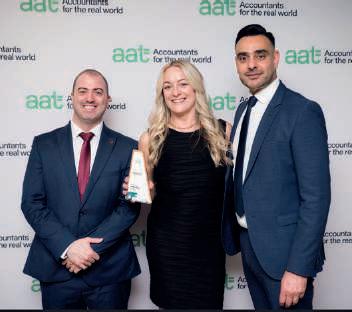
2024 was Riverside Training.
Check out all the winners on page 22
ACCA signs exam deal with Uzbekistani body

ACCA and the Association of Certified Finance Professionals of Uzbekistan (ACFP) has agreed a joint examination scheme (JES) designed to enhance accountancy education and knowledge in the country.
Adam stressed that individuals also start to lose their personal tax-free allowance (£12,570) once their income crosses £100,000, pushing up their marginal tax rate to 60%.
The IFS has calculated that a parent who earns £134,000 with two children could be worse off than someone earning £99,000.
HMRC quick U-turn on closing telephone lines HMRC halted its proposed
The JES is focused on ACCA’s Advanced Diploma in Finance and Business in Russian (ADFBR). The ADFBR comprises seven exams and the Professional Ethics Module. As part of the JES individuals will have the
changes to its helpline services barely 24-hours after making the announcement on big, permanent cuts!
It said this is in direct response to immediate feedback, and now promises to engage with stakeholders about how to ensure all taxpayers’ needs – including small businesses – are met as HMRC shifts more people to online self-service in the longer term.
This means the phone lines for Self Assessement, VAT and PAYE will remain open between April and
opportunity to take examinations in taxation and law in compliance with Uzbekistan’s legislation.
In addition, after completing the ADFBR, students will be eligible to transfer to ACCA’s Strategic Professional level.
Mumin Ashurov, Director of ACFP, said: “We look forward to seeing students start to study the joint qualification. We are confident it will increase accountancy knowledge and expertise and will contribute to economic growth in the country.”
The JES is expected to run for an initial five-year period.
September, for this year anyway. HMRC’s CEO Jim Harra admitted that the pace of change in services needs to match the public appetite for managing their tax affairs online.
NI cuts are here
The National Insurance rates fell from 10% to 8% for 27 million workers across the UK, the second cut in a year.
It means anyone earnings a salary of £35,000 will have an extra £450 in their pockets.
8 PQ the PQ Magazine May 2024 news
Get your head around the new question types from AAT. Get Rogo.
Easily create accurate practice exams with Rogo’s question types, matching the new formats from AAT assessments.











to learn more
Visit getrogo.com
ANNA KATE PHELAN

Apple facing a sticky time in the US
There’s a big story developing in the US that may have a worldwide impact on the handheld device space.
The US Department of Justice (DOJ) is suing Apple for monopolising the smartphone market. They argue that Apple’s “exclusionary conduct” makes it difficult for people to switch phones, undermines industry innovation and imposes unnecessary costs on businesses, software developers and consumers alike.
Apple have been accused of blocking the growth of ‘super apps’, with functionality that would allow users to easily move between different smartphone platforms, diminishing the quality of cross-platform messaging apps so that consumers continue to buy iPhones. It is also accused of supporting limited functionality to drive purchases of both Apple Watch and iPhone, and limiting third-party digital wallets by preventing apps from developing their own cross-platform tap-to-pay.
The practice of enhancing a product’s ‘stickiness’ (the degree to which users have to return to the product time and time again) is well established in the tech industry. It appears that Apple may have hurtled towards increasing this metric without proper consideration of the potential legal ramifications.
It’ll be interesting to see how this case pans out. We have already seen a regulatory win for consumers, with the EU mandating that from the end of 2024 all portable electronics should use a USB-C charger, which will lessen the product ‘stickiness’ induced by Apple’s lightning charger cable. Watch this space!
FRC revises accounting standards
The FRC has issued what it says are “comprehensive improvements to financial reporting standards” for the UK and Ireland, which are used by 3.4 million businesses.
The changes follow extensive stakeholder engagement and consultation on the proposals with the FRC required to undertake a review of FRS 102 every five years.
The most significant changes apply to leases and revenue recognition to align with recent changes to international financial reporting standards. The changes

will provide better information to users of financial statements, including current and potential investors and lenders. In response to stakeholder feedback, the FRC said it has made improvements to the proposals for lease accounting and revised the recognition
Record year for Grant Thornton

It was another year of record performance for Grant Thornton, with net revenue up over 7% to £654m and operating profits up
18% to £146m, according to the 2023 annual report.
For the 12 months to 31 December 2023, the firm took on
exemption for leases of low-value assets to clarify that the focus is to ensure that the most significant leases are recognised on the balance sheet.
The FRC has also made a number of improvements and clarifications that are designed to make it easier for preparers to apply and understand the standards.
The FRC will also be hosting a webinar to discuss the new standards at 11am on 15 May 2024.
5% more employees, including over 1,200 new joiners and 25 new partners. Partner pay was up 11% to £644,000.
Grant Thornton’s CEO, Malcolm Gomersall, said: “2023 was another standout year for our firm and that’s down to the contributions of the more than 5,500 people who make up Grant Thornton. Whilst uncertainty, inflationary pressures and overall trading conditions continued to impact our markets, our firm’s resilience meant we are able to continue investing in our people and operations to remain a top choice for clients.”
Bahrain recognises AAT qualifications
Bahrain has recognised all seven of AAT’s qualifications, with the country’s education and training quality authority (BQA) aligning them with its domestic training framework.
Claire Bennison (pictured), AAT’s Executive Director of Customers, Partnerships, and Innovation, said Bahrainis completing an AAT qualification would rightly feel pride in their government’s affirmation of their new skills and knowledge.

More than 6,000 Bahrainis have studied the AAT qualifications since it began offering them to learners in the Middle East in the 1980s.
She said: “This recognition by Bahrain’s qualifications watchdog will be welcome news for the thousands of Bahrainis who already have AAT qualifications, but also for those who are aspiring to join our dynamic, global profession. Learners now have the clear assurance that with AAT they will gain a qualification of the highest standard.”
AAT is now hoping more countries across the Middle East will follow Bahrain’s move.


Female senior partner anyone?
Who wants to be PwC’s new UK boss? There are three candidates for the job: Marco Amitrano, head of clients & markets; Laura Hinton, head of tax; and Hemione Hudson, head of audit.
This is the first time women have appeared on the ballot, and there has never been a female boss of the PwC’s UK arm in its 175-year history.
The vote among partners takes place in April, and the winner will be unveiled at the end of the month.
Outgoing boss Kevin Ellis has spent eight years at the helm.
Deloitte expand office space in London
Deloitte has taken on more office space in central London less than two years after making drastic cutbacks, according to the Financial Times.
The Big 4 firm added 70,000sq ft of space in Shoe Lane, near its New Street Square HQ, and this means more staff will be returning to the office.
Deloitte told the FT: “In February we opened three floors in 66 Shoe Lane, with a fourth to follow later in the year – they are a mix of workspace and client space and increase our overall London campus space by 18% to support our growing business and ways of working.”
KPMG’s Jon Holt elected for second term
KPMG in the UK has confirmed that, following a partnership vote, Jon Holt has been re-elected with overwhelming support to serve a second term as the firm’s Chief Executive and Senior Partner.
Holt was appointed as CEO in April 2021, following KPMG in the UK’s move to a new governance model, which created separate roles for its Chair and Chief Executive.
Holt said: “2024 will see us make some big changes – combining our deals and consulting businesses into one practice called advisory –and exploring a potential merger with KPMG Switzerland to give us more collective power to invest and build new services for our clients.”
10 PQ the PQ Magazine May 2024 news
Anna Kate Phelan is Head of Product at Eintech




















BOOK YOUR FREE TICKET WWW.ACCOUNTEX.CO.UK/LONDON PRIORITY CODE ACX132 TAKE YOUR PLACE AT THE FOREFRONT OF ACCOUNTANCY AND FINANCE THE No.1 ACCOUNTANCY & FINANCE EXPO NETWORKING EXHIBITION EDUCATION GET UP TO 16 CPD HOURS
EDDIE HERBERT

Crucial partners in setting SBTi targets
Accountants are emerging as vital partners for companies seeking to set ambitious emissions reduction targets through the Science Based Targets initiative (SBTi).
The SBTi enables organisations to align their climate strategies with the latest scientific consensus on limiting global warming to 1.5°C above pre-industrial levels, as outlined in the Paris Agreement.
By setting ambitious yet achievable emissions targets, companies can become climate leaders. This proactive approach enhances brand reputation in an increasingly eco-conscious marketplace and future-proofs businesses against potential regulatory risks.
Accountants’ expertise in stakeholder engagement can be invaluable in the SBTi journey. Their ability to understand current practices, future ambitions and feasible emissions reduction pathways helps ensure targets align with operational constraints and financial objectives.
Climate specialists such as Net Zero Now can turn these insights into actionable plans.
Net Zero Now’s end-to-end services equip companies to effectively set and meet ambitious emissions targets, from accurately measuring baseline emissions to conducting stakeholder consultations, reviewing reduction models and, ultimately, submitting targets for SBTi validation.
Ariel Edesess, ESG Senior Analyst at Hill Dickinson, said: “Working with the team at Net Zero Now to set acceptable sciencebased targets has been a powerful driver for us to make real, impactful changes.”
Using carbon accounting platforms, accountants can streamline the SBTi journey for their clients, fostering impactful sustainability efforts while contributing to the global fight against climate change.
Edward Herbert, Sales & Business Development Manager, Net Zero Now
Tech briefs
Google to charge
Google is believed to be looking at charging users for ‘premium’ internet search results powered by artificial intelligence (AI).
The tech giant’s main search engine would remain free to use, with additional content available to those who pay a fee, sources told the Financial Times.
Adverts would still appear alongside search results, even for subscribers, says the FT. However, charging would be the first time
US justice department sues Apple
A civil antitrust lawsuit has been filed against Apple over its “monopolisation or attempted monopolisation of smartphone markets in violation of section 2 of the Sherman Act”.
The US Justice Department and 16 other state and district attorneys are alleging Apple illegal maintains this monopoly over smartphones by selectively imposing contractual restrictions on developers. It is also claimed that Apple withholds critical access points into the market. That means Apple undermines apps, products and services that would otherwise make users less reliant on the iPhone, pushing

up costs for customers and developers.
The lawsuit emphasises it wants to restore competition to the markets “on behalf on the American people”.
Attorney General Merrick B. Garland said: “Consumers should not have to pay higher prices
because companies violate the antitrust laws.”
He continued: “We allege that Apple maintains monopoly power in the smartphone market, not simply staying ahead of the competition on its merits, but by violating federal antitrust law. If left unchallenged, Apple will only continue to strengthen its smartphone monopoly. The Justice Department will vigorously enforce antitrust laws that protect consumers from higher process and fewer costs.”
Meanwhile, Apple has rejected the allegations in the lawsuit and says it threatens the company’s core operations.
Intuit Quickbooks launches Bureau Payroll
Intuit Quickbooks has launched a standalone Bureau Payroll product for accountants, which is says will accelerate payroll for UK businesses.
Nick Williams, UK Product Director at Intuit QuickBooks, said: “QuickBooks Bureau Payroll was developed to alleviate the pain points that accountants face on a daily basis. Our research shows that payroll consumes up to one hour per client per pay cycle, which can

impact other critical tasks.
“The automation introduced by Bureau Payroll really makes
our solution unique. For instance, the automation of directoronly pay-runs has been met with a lot of enthusiasm from our accountant customers, who see the opportunity to reduce time spent on payroll accordingly. By boosting efficiency without sacrificing accuracy, accountants will have more time to focus on work that directly benefits their clients.”
Wolters Kluwer launches AML module
Wolters Kluwer has released an anti-money laundering module (AML) within its CCH iFirm platform.
A cloud-based solution, CCH iFirm AML provides accounting practices with the flexibility to manage AML compliance from anywhere at any time. In addition, it will offer biometric KYC – using
Google has made people pay for enhancements to its core search product.
Of course, Google already charges for some features such as storage space and for access to Gemini AI assistant in Gmail and Docs.
KPMG and Databrick
join forces
KPMG UK has formed a strategic alliance with Databricks, a leader in data and artificial intelligence. The alliance will help the firm’s clients
facial recognition to identify and authenticate individuals. This will remove the need to scan and email documents and check photos, helping to ensure secure and efficient identity verification, alongside a standard AML check.
Natasha Chryssafi, director of product management at Wolters Kluwer explained: “We realise that
get the most out of their data and AI and empower them to innovate at a faster pace.
Generative AI could add an additional £31bn to the UK economy per year, according to KPMG estimates.
It said that KPMG’s technical expertise, in combination with the Databricks Data Intelligence Lakehouse Platform, will help clients innovate using an open, scalable platform to meet all their data-driven requirements.
KPMG’s Audit practice is also
compliance with AML and knowyour-customer (KYC) requirements is vital for accounting firms, especially in light of continuing shifting regulations. CCH iFirm AML helps to transform the way companies manage their AML duties, helping them mitigate the risks associated with poor AML and KYC practices.”
embedding the Databricks Data Intelligence Platform with KPMG Clara, KPMG’s global audit technology platform.
Drones – a power for good!
One of the announcements in the Spring Budget that might have gone under the radar was the Government’s investment in drones for the emergency services.
However, PwC stressed an equal focus should be given to integrating drone data with existing systems.
12 PQ the PQ Magazine May 2024
tech news






Become a CGMA® designation holder with the CGMA® Finance Leadership Program.



Establish your expertise in the profession with the CGMA Finance Leadership Program (CGMA FLP). A digital-first learning and assessment platform, the CGMA FLP accelerates your route to the designation with flexible learning whenever and wherever you want.
Find out more at aicpa-cima.com/flp.


Founded by AICPA® and CIMA®, the Association of International Certified Professional Accountants® powers leaders in accounting and finance around the globe. © 2023 Association of International Certified Professional Accountants. All rights reserved. 2307-444079
BRAINIACS BRAINIACS BUSINESS WANTED

Lord Sikka is right
At first I thought that Lord Sikka’s call for an independent inquiry into the role of the accountants and auditors in the Post Office scandal was another way for him to ‘stick it to the establishment’. But after reading your frontpage article (PQ, April ’24) and listening to his recently uploaded video on YouTube, I have to say I have come over to his way of thinking.
We should know the name of the person at the Post Office who sacked the forensic accountants at Second Sight in 2013. I also see new evidence shows (in leaked recording) that officials knew of instruction for Fijitsu to remotely change sub-postmaster

accounts 10 year ago. All this was suppressed.
And the tapes reveal CEO Paula Vennells was also told about the serious issues in July 2013. It does all seems to
be unravelling for Post Office executives.
Finally, can I say that chartered accountant Rebecca Benneyworth (PQ, April ’24, page 36) just goes up and up in my estimation. It is interesting that her mum was a subpostmistress because she really understands how the scandal would have affected her. Her free website to help with the tax implications of compensation payments is a godsend for sub-postmasters and she should be made a dame!
Name and email address supplied
The Editor says: You can check out Lord Sikka’s arguments for an inquiry at https://youtu.be/ jkCWvJt0l6A. As our reader says, it is well worth a listen.
2XU�VWDU�OHWWHU�ZULWHU�ZLQV�D�IDQWDVWLF�o,�ORYH�34p�PXJ�
Lots of people have been watching Lord Sikka on YouTube talking about the Post Office Scandal. Here are some of your comments…
“A coherent and succinct overview. As Lord Sikka highlights, on the face of it this seem like an egregious failure by the internal and external auditors. Time after time with these major scandals we see that the external auditors prioritised their cosy financial relationship with the company over their broader legal obligations to the shareholders and the public interest. Arthur Andersen at Enron is the most salient example, but EY must surely bear some responsibility here. They have somehow managed to keep a low profile during these proceedings. As the good Lord says, time for an enquiry to examine their role! They should surely be contributing to the compensation of the SPMs, alongside Fujitsu and the POL?”
“Don’t go to market with a prototype with the expectation that bugs can be addressed on a live system. Classic failure of

project management no doubt caused by senior management demanding early results to get their bonuses. Bonuses drive short-term thinking and really ought not to be a feature of remuneration packages on taxpayer funded projects, ever.”
“What evidence besides a computer system did the PO have that the shortages were in fact real (none)? The computer should have been the first thread indicating as the PO saw it as theft. The next step should have been to discover where
the money went. They checked bank accounts, etc., but did not discover any missing money. In fact they discovered the opposite, that SPMs were taking out loans, borrowing money from friends & family to make up the shortfalls. Why would anyone who was stealing money arrange for loans (ending in bankruptcy, suicide, etc.) to pay back that same amount of money, doesn't sound logical.”
Watch the video at https:// www.youtube.com/ watch?v=jkCWvJt0l6A




@hmtreasury sent out a post on X (formerly Twitter) explaining: “Small businesses are the backbone of the UK economy. That’s why we’re cutting tax for small businesses, taking 28,000 out of paying VAT altogether. Another long-term decision to grow our economy.” Let’s just say it didn’t quite get the reaction it was expecting! Oh, and it put this out on 1 April.
David Pearce said: “Hmm. It’s not the business that pays it, but their customers. The business just passes it on.” Dean Maisey agreed, saying: “Small businesses don’t pay VAT – their customers do. If the business de-registers they can no longer reclaim the VAT they pay to suppliers for services/materials. So unless de-registering generates more business to cover the lost reclaimable VAT, the business will be worse off.”
Dan Richards said: “Surely a bad taste April Fools’ joke, as small businesses currently have the highest tax burden in years…” And Graham (not the editor) tweeted: “£5,000 is dwarfed by the increase in energy bills, interest rates, cost of living and commencement of bounce back loan repayments.”
Hud Pug wondered: “Is this another party election broadcast on behalf of the Tory Party?”
Interestingly (well, we were interested), the Electoral Commission answered this tweet. It said: “Communication from government departments providing information on a policy typically does not fall under electoral law. Electoral law covers such things as spending and donations by political parties and candidates, and the transparency of election material.”
All sorted then! Well, at least the tweet got 23.1K views. There are 456,200 people following @hmtreasury.
PQ Magazine PO Box 75983, London E11 9GS | Phone: 07765 386489 | Email: graham@pqmagazine.com Website: www.pqmagazine.com | Editor/publisher: Graham Hambly graham@pqmagazine.com | Associate editor: Adam Riches | Art editor: Tim Parker Contributors: Robert Bruce, Prem Sikka, Lisa Nelson, Anna Kate Phelan, Tony Kelly, Phil Gammon, Edward Netherton, Francesca Cullaney | Subscriptions: subscriptions@pqmagazine.com | Origination services by Classified Central Media If you have any problems with delivery, or if you want to change your delivery address, please email admin@pqmagazine.com Published by PQ Publishing Ltd © PQ Publishing 2024
email graham@pqmagazine.com
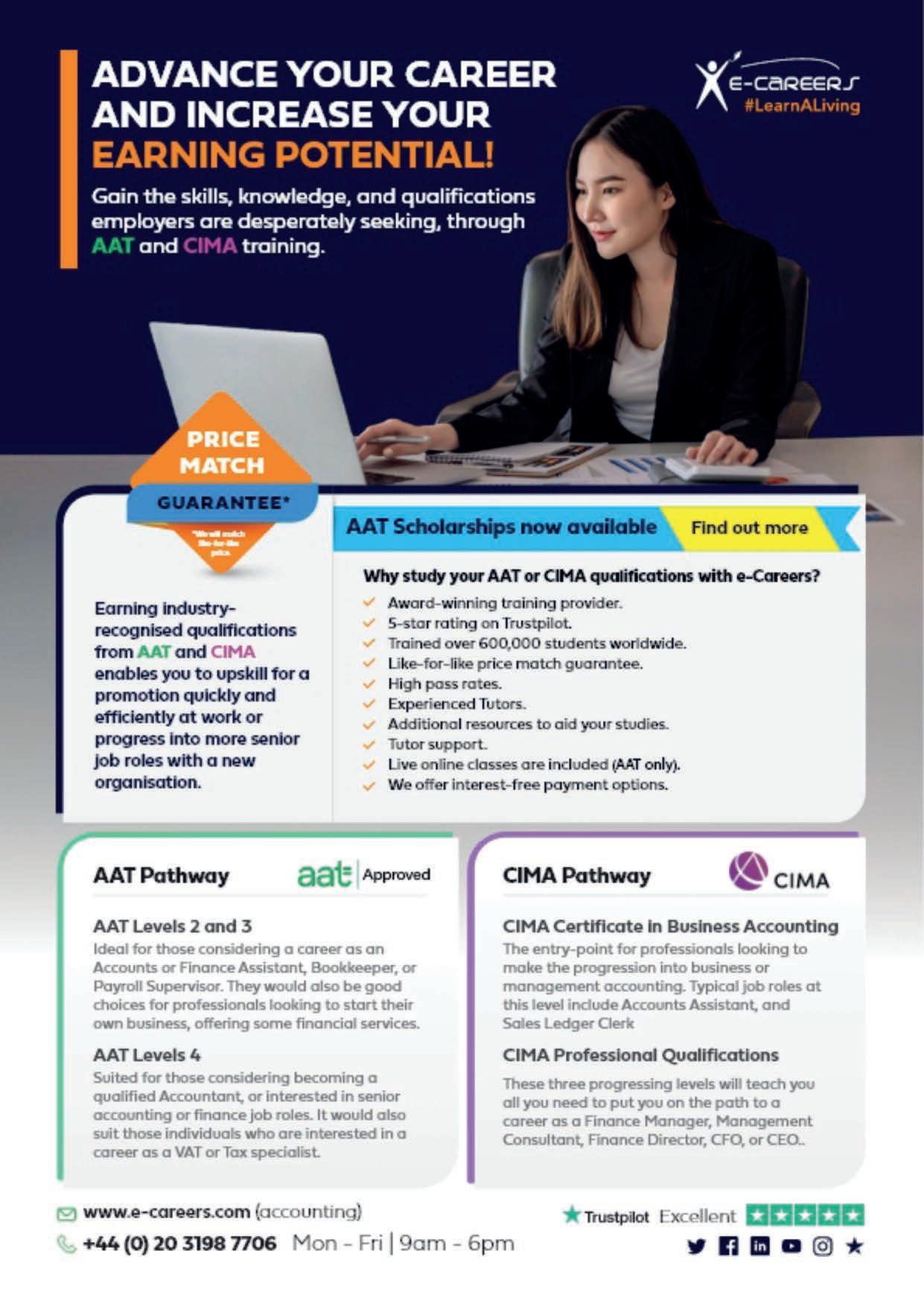
OUR 2024 FINALISTS
The red carpet is being rolled out for all the finalists for the PQ magazine awards night. Who made it onto our shortlist this year? Well, here they are:


STUDENT BODY OF THE YEAR
Chartered Accountants’ Student Society of London
Northern Chartered Accountant Students’ Society
Nottingham Chartered Accountants Student Society

ACCOUNTANCY BODY OF THE YEAR
(announced on the night)

ACCOUNTANCY COLLEGE OF THE YEAR
PUBLIC SECTOR
Manchester Metropolitan University
Newcastle University Business School
University of Winchester
PRIVATE SECTOR
Accountancy Learning Limited
Future Connect Training & Recruitment
Kaplan
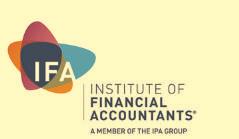
ONLINE COLLEGE OF THE YEAR
First Intuition
FME Learn Online Training Link


ACCOUNTANCY LECTURER OF THE YEAR
PUBLIC SECTOR
Dr Samar Gad, Kingston University, London
Dr Faisal Sheikh, Nottingham Trent University
Lim Keong Teoh, University of Winchester
PRIVATE SECTOR
Karen Groves, e-Careers
Ahmed Shafi, Mirchawala Hub of Accountancy
Maria Yearsley, Kaplan

STUDY RESOURCE OF THE YEAR
Accountext+
Corporate Reporting Revision
Preparation Session, First Intuition
Premier Training’s ‘Every1Welcome’ series
The Little Book of Secrets from AICPA & CIMA

INNOVATION IN ACCOUNTANCY
Creative Accounting, a collaboration between academics from QMUL, Coventry University and Monash University, Australia
First Intuition Accountancy Academy
Icarus accounting simulation App, UCL & Lynsie Chew
Nottingham College’s AAT delivery

BEST USE OF SOCIAL MEDIA
Bee Motion
Career Goals by Kaplan



Will Boardman (YouTube @willboardman) PODCAST


OF THE YEAR
Exam World Meets Business World, Paul Merison, LSBF
Kaplan’s Learn Better Podcast
Marty Windle SBL Guru Podcast

The First Intuition Podcast TRAINING MANAGER/ MENTOR OF THE YEAR
Zeeshan Ahmed, Future Connect Training & Recruitment
Dr Ishani Chandrasekara, Queen
Mary University of London
Libby Walklett, the Ethical Bookkeeper

ACCOUNTANCY TEAM OF THE YEAR
Newcastle University Business School
St Mary’s Accounting Services
The Financial Systems Team at Christie NHS Foundation Trust

GRADUATE/ APPRENTICESHIP TRAINING PROGRAMME OF THE YEAR
Buzzacott LLP
First Intuition Apprenticeship Training Programme
KPMG

ACCOUNTANCY PERSONALITY OF THE YEAR
Sarah Ghosh
Grace Hardy
Gareth John
EDITOR SPECIAL AWARDS
(announced on the night)

ACCOUNTANCY APPRENTICE OF THE YEAR
Diana Hume, Department of Business and Trade
Armanda Nazuiri, London Borough of Newham Council
Tomos Rees, Clay Shaw Butler


DISTANCE LEARNING STUDENT OF THE YEAR
Marina Frost
Katie Robinson
Gayane Voskanyan

ACCOUNTANCY GRADUATE OF THE YEAR
Corina Birca, London South Bank University
Tim Mickleburgh, University of Manchester
Alhaam Noer, University of Leicester

NQ OF THE YEAR
Bethany Duffy
Lyndsay Falconer
Arthur Kaliisa
Aishani Sinha

PQ OF THE YEAR
Luke Carter
Grazia Maria Pia Salcuni
Morgan McIntosh
Declan Stoppard
PQ Magazine May 2024 PQ Awards 2024 16 PQ

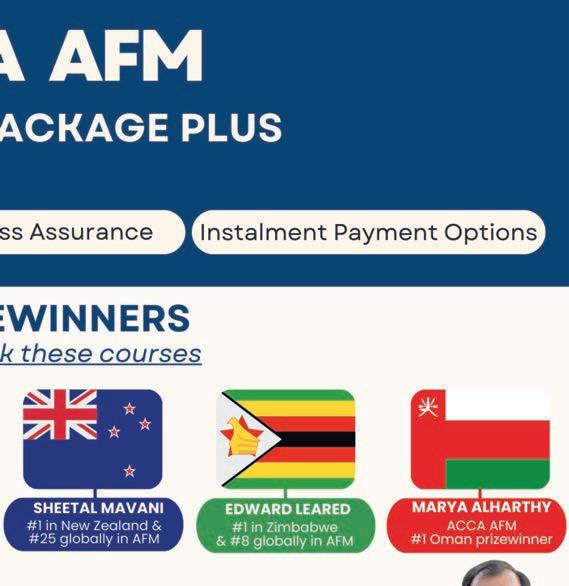





For more information and to receive 15% off your ICB Exemption application, call ICB HQ on 0203 405 4000 and quote ICBPQ Email us at exemptions@bookkeepers.org.uk www.bookkeepers.org.uk/PQ PQ with AAT, ACCA, ICAEW or CIMA? Why wait? Join ICB today! Fast track your career by using your existing qualifications to join the world’s largest bookkeeping organisation. As a Certified ICB Bookkeeper you’ll benefit from: Professional status and recognition Free legal and technical advice-line Local and national events Resources, webinars, templates and help sheets Accounting news, emails and updates Discounts with 100s of retailers including Sainsbury’s, Tesco, ASOS, and Curry’s And being part of a community that really cares The Institute of Certified Bookkeepers
Redefining accountancy training
ICAS explains what the new syllabus will look like and how it is changing the way students learn
The Institute of Chartered Accountants of Scotland (ICAS) has unveiled the biggest shake up in how it trains accountancy students in its 170-year history.
ICAS has launched both a new syllabus and a new way of learning for students. The new syllabus will make sure that the qualification remains relevant in an evolving global business landscape and ICAS students will learn through a UK first training model.
The new syllabus includes future-focused themes of sustainability, technology, and business ethics, alongside the core technical accountancy skills that the CA qualification is globally renowned for.
Great leap forward
Gail Boag, Executive Director of Learning at ICAS, said: “The introduction of the new syllabus and learning delivery model is the biggest leap forward yet in the way we train CAs. It allows us to keep pace with the influence of global socioeconomics and technology on business today. Firms were calling for greater flexibility in how we train students, and now thanks to our new model this is possible.
“While we have always updated our syllabus to reflect global developments to make sure that each generation of CAs remains relevant, this change is more significant, reflecting technological and other geopolitical factors that both enable and disrupt the profession.
“The qualification focuses on so much more than finance and equips students with the skills that they need to be business leaders of the future, incorporating ethics, sustainability, and use of technology as part of the syllabus.
“The method in which we deliver the CA training has evolved dramatically, creating the best possible learning environment which combines remote digital learning with in-person classroom and community events. But we also know that the true barometer of our success is the impact that our students will go on to make throughout their careers with the skills that we equip them with now. The CA designation remains a badge of quality and trust, something that can be seen in the fact that CAs hold senior positions in 83% of FTSE companies.”
The new syllabus was created in response to demands from the accountancy profession for a qualification that meets their challenges and helps them attract the best talent.

Sustainability and the impacts of technologies like AI are rapidly driving changes in the business environment and shaping the next generation’s career expectations.
The new ICAS syllabus empowers CAs by providing them with practical skills and knowledge to collaborate, communicate and provide leadership on sustainability issues. Helping boards and management understand the link between those issues and financial performance.
Reshaping the role
New courses cover topics such as data analytics and business intelligence, and students learn directly on the digital platforms, such as Xero and Power BI that are currently reshaping the role of the accountant, something that has not been done before.
Bruce Cartwright CA, CEO at ICAS, said: “Throughout our 170-year history, ICAS has constantly reinvented itself to remain relevant in an ever-changing world. The introduction of this new syllabus represents one of the biggest changes we’ve ever made. We believe it goes beyond the numbers, to foster the ethical mindset, technical skills, professional knowledge and practical experience that will establish CAs as the business leaders of the future.”
Scheduled across four terms each year, there are now more enrolment options and greater control over the paths students can follow.

Save time on your career progression with the CGMA® Finance Leadership Program.
Employers can also choose how quickly their students’ progress and how often and when they’re in the office focused on work and clients.
Three years’ time
Unique to ICAS, employers and students can see their course schedules three years in advance, and new electives provide opportunities for specialisation and role-relevant learning. All this is delivered while still maintaining the high levels of challenge and integrity for which the CA qualification has long been known.
The syllabus also features additional touchpoints that maximise students’ engagement with tutors and peers. These include in-person workshops, pre-assessment drop-in sessions and ICAS’ first-ever UK-national induction event, which will be held at the Edinburgh International Conference Centre on 9 September.
For the first time in the UK, accountant trainees and their employers can see what they’ll study for the entire three-year period at the start their studies. They will also be able to choose when they study certain subjects and specialties meaning that both the student and the employer can plan when they will study and when they’ll learn on the job, servicing clients and working in the business. Training with ICAS will also mean that students can study online, but also access in person workshops and tutor time.



18 PQ PQ Magazine May 2024 new ICAS syllabus
WANTED BRAINIACS BUSINESS

On Your Marks…
ACCA launches podcast series designed to help to PQs deal with the common issues confronting them as they look to get qualified
Are you putting off booking your first exam, or struggling to get back into studying after a failure?
A new podcast series launched by the ACCA, called ‘On Your Marks’,explores techniques to help students tackle any potential challenges head on, wherever they are at in their journey to qualification.
Hosted by ACCA’s Krutika Adatia (pictured), podcast guests include experts ranging from a life coach to a neuroscientist, to help students understand what can hold them back when setting out to achieve their goals – whether that’s preparing for an exam or training for a marathon.
From the importance of hanging out with your mates to the neuroscience of procrastination, the series explores how to get going when the going
gets tough – including techniques for building resilience for when life doesn’t go our way.
The episodes
Episode one – Preparing to start: Why can it be so hard to start something new, even if we want to? What might help us take the first step? We sit down with Michelle Elman, a five-board accredited life coach, author, broadcaster and public speaker, and all-round expert in helping people face their demons and rise to personal challenges. From coping with pre-exam nerves to dealing with envy when people post their wins on social media, we look at how we can clear the path ahead and get working on our goals.
Episode two – Setting great goals: In this episode we’re talking goal setting. We sit down
with cognitive behavioural therapist Sarah D Rees to understand why some of us struggle with setting, and achieving, our goals. From breaking down big plans to calming your inner critic, and rewarding yourself along the journey, we look at strategies to help keep us all on track –both practically and emotionally, while working towards our objectives.
Episode three – Building resilience: Pushing on towards our goals is great, but as we all know life can have a way of messing with even the best laid plans. In episode three it’s all about becoming more resilient. We sit down with Josh Wintersgill, Great Britain’s Young Entrepreneur of the Year in 2019 and founder of AbleMove, to dig into the topic of resilience. From tips on facing up to failure to an honest look at coping when we’re feeling low, we talk about strategies to keep us all going when the going gets tough.
Episode four – Nourishing relationships: When we’re pushing towards a goal, or just generally having a tough time, many of us will instinctively turn to our friends, family, colleagues or even pets for support. Why? In this episode we’re talking relationships. We sit down with Dr Anna Machin, an evolutionary anthropologist who has spent her career studying the science of close human relationships. From the neurochemicals underlying your tightest friendships to tips for the best social activities for your brain when you’re facing down deadlines, we dig deep into how our connection with others helps us get where we want to be.
Episode five – Beating procrastination: Procrastinating over tasks, even ones we care about, is a normal if painful part of life for most of us. We sit down with Dr Julia Ravey, a neuroscientist, author and self-confessed procrastinator. She’s an expert in understanding what’s happening in our brains when we put off tasks – from conflicts between the logical and emotional centres of our brains, to tricks for creating sustainable revision habits.
Episode six – Exploring ACCA resources: In this final episode we sit down with Paul Kirkwood, ACCA’s Regional Head of Education and Learning for ACCA in the UK. Paul is joined by new ACCA member Shaun Fenwick, who works in the accounting team at Brixton Brewery and recently completed all his exams. We talk about starting the qualification and the decisions you need to make, the common fears and struggles, resources available through your ACCA journey and how to push yourself to take that first step.
View now or listen through wherever you get your podcasts. And don’t forget to subscribe!
• Thanks to ACCA for this article


PQ 19 PQ Magazine May 2024 ACCA podcasts
Registered Tuition Provider


We are the AAT Distance Learning Training Provider of the Year!
To celebrate, we are offering £200 off AAT Accounting courses and £50 off AAT Bookkeeping courses throughout April.
This could be the perfect time to gain a practical, internationally recognised accountancy qualication that can open doors in any industry.
We offer interest-free instalment plans for all courses, as well as FREE Xero accounting software training and certication.
Please contact us on 01469 515444 or info@premiertraining.co.uk with any questions you may have.
You can also enrol online at www.premiertraining.co.uk
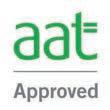


Get Started Today
Start your studies the same day24 hour online access with instant access to tutor support.
Learning Resources
Award winning learning resources including printed books, eBooks & e-learning, videos and quizzes.
Assignments
Prompt marking turnaround –marked by a tutor (not a computer).

Xero Advisor Certication
Training has teamed up with Xero and is pleased to offer the Xero Advisor Certication Equivalency Course FREE OF CHARGE to anyone who enrols.
Premier
515444 AAT Distance Learning AAT Distance Learning
www.premiertraining.co.uk 01469
How are your writing skills?
It’s time to write your way to your success, says
Cath Littler
Ihad the pleasure delivering a workshop to tutors and managers at AAT’s face-to-face training provider conference, something that I have done so often that none of us can remember a TP conference when I wasn’t running a workshop!
While the topics over the years have changed, the single thread of teaching accountants writing skills has remained constant and, whether English is a first or second language, there are three main points you should remember:
• Confidence and skill are built through repeated practice.
• You can learn how to structure an email to a client or an exam answer by learning the right phrases and including the right information.
• It is important to understand what you are being asked.
The yin and yang of practising writing
The really great thing about practising writing is that it helps you to understand what you are writing about. This is because if you write about something you must understand it enough to get your point across. You probably find writing to a friend about something that you are passionate about easy – because you know what you want to say and have probably said it repeatedly.
However, the first time you write about something your brain is not ready, so it is hard to find the right words. The more you write, the more you understand, and everything gets easier. This is because you have arranged the information in your brain ready to be shared.
So if you go into an exam and have to write about something that you have never written about before, you will struggle to do it well. If you have had a lot of practice, you will find it easier and quicker to answer questions and to get a good mark.
The right words and phrases
One of my roles is to end-point assess AAT apprentices who often discuss how difficult they found answering the phone or writing emails to clients when they started. Once they understand what words and phrases to use it becomes easier. After all, accountants must repeatedly email clients for information and the information required is usually similar, so the main section of the email will also be similar. The first email
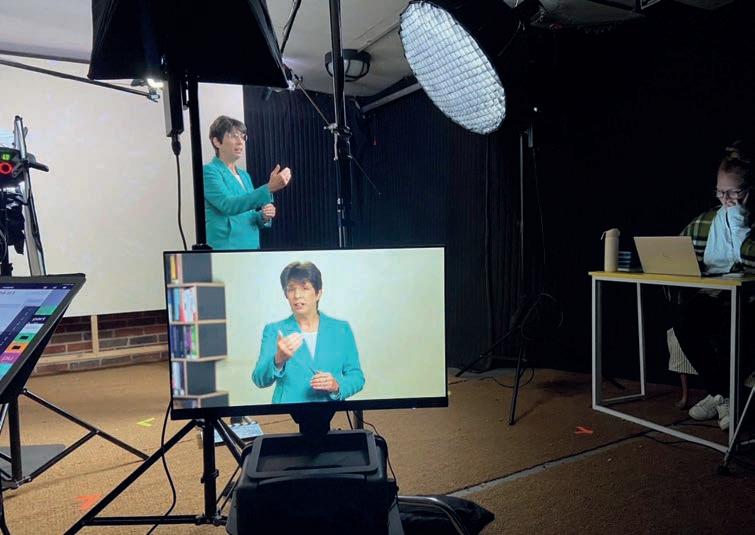
to a client will take a long time to put together and will be checked by a manager, but over time trainee accountants learn the right phrases to use and the right information to ask for.
The same principle can be applied to answering exam questions. When you start practising it is hard, but over time and with regular practice you will learn the right words and phrases to use, and it becomes easier.
At the conference workshop I also encouraged tutors to use a range of different scenarios for learners to practice on. That is because it widens the learning experience; the more you must apply your knowledge to different situations, the better you understand it and can apply it at work and in an exam.
The right information
It is also always important to include a good amount of detail when communicating with clients or answering an exam question. For example, if you are emailing about an overdue invoice, you will include the invoice number, date, amount and when payment was due. If you are writing about changes to profit margins you should not just say that the margin has improved – that is not going to help the client or
get marks in an assessment. Instead, you should say something like ‘Profit margin has increased from 10.2% to 11.4%, showing that for every £1 of income, the organisation is now earning an extra £0.012 profit.’ That helps the client, and the examiner knows that you understand the principle.
So include details and explanations, even if it seems too obvious to you. The client and examiner need to see the information.
Understand what you are being asked
This is where answering client questions can be different from answering exam questions. Clients are often not sure what they are asking so some backwards and forwards is usually required before understanding is reached.
In exams you only get one shot at answering, so examiners use command verbs such as ‘state’, ‘explain’, or ‘describe’. You need to understand the differences between the verbs and what they are asking. AAT has lots of e-learning on command verbs – much of which I have written, so go and have a look so that you understand what examiners are asking.
• Cath Littler, head of learning and development at Mindful Education

PQ AAT Training Provider Conference
Awards
And the award winners are…
The AAT recently unveiled the winners of its Training Provider Awards 2024 – back after being away for four years. So who walked off with the coveted trophies?
Opening the 2024 awards in Nottingham, AAT CEO Sarah Beale, said: “Our Training Provider Awards recognise the life-changing excellence evident in the work of so many of our training partners. And this year’s calibre of nominations was exceptionally strong.”
AAT first held these awards in 2016, but this year was the first opportunity providers had to come together since the onset of the pandemic.
Addressing the room of 150 finalists, Beale stressed: “I want to congratulate each and every training provider, student and tutor who has been shortlisted for these prestigious awards. Each one of you has shown outstanding performance in the classroom, online or in the workplace.”
She went on: “Whilst being a finalist for an AAT Training Provider Award is an achievement in itself, the small number who clinched the top prizes can now rightly claim to be industry leaders.”
Beale thanked the judges for volunteering their time to shortlist the dozens of stand-out nominations, and who made the final call on the night’s winners – among them was PQ magazine’s very own Graham Hambly.
In all, 10 AAT awards were up for grabs. Prize categories for training centres included best
THE 2024 WINNERS IN
Small, Medium, and Large Training Provider Of The Year, New Provider, Distance Learning Provider, and Training Provider of AAT’s highly regarded apprenticeship programme.
Exceptional educators were also acknowledged on the night. The award for AAT Tutor of the Year went to Karen Groves of e-Careers. Meanwhile, learners Stephanie Goodsell and Katie Robinson received AAT’s top awards for best apprentice and best student, respectively.
The night’s first heart-stealing moment went to AAT Apprentice of the Year Stephanie Goodsell, who collected her award on stage supported by her positively beaming mum and nan, supremely proud of their Steph’s achievement.
Guests were told that Steph, who studies with Peak Accountancy Training, excelled in everything she does. She displayed serious commitment to both her academic studies and workplace responsibilities, having achieved first-time passes on all her AAT assessments and excellent grades in the process. Steph also received outstanding feedback from her placement employer, with the firm’s leadership noting the winning apprentice excelled in a variety of workplace challenges, including
dealing with VAT returns in foreign currencies and even playing a teaching role in helping senior managers navigate new accounting software.
The evening’s host, television personality Scarlette Douglas, said for many students taking the apprenticeship route balancing work and study is not always straightforward. She explained: “The world of work can be a challenging environment to adjust to, especially for those fresh out of school, but some apprentices excel and thrive. Steph, our AAT apprentice of the year, is clearly one of them.”
Douglas also announced AAT’s Student of the Year as Training Link’s Katie Robinson, the second ‘heart steal’ of the evening. “A remarkable student in every single aspect,” Douglas told the audience, “Katie overcame adversity when her dad became seriously ill early into her studies, requiring a three-hour round trip to visit him in hospital. She did this every day, on top of her study and work commitments. Despite the challenges, Katie achieved impeccable academic results in her AAT studies – even sharing her journey to motivate and inspire others.”
You can read more about Katie on page 26
Best


PQ 22 PQ Magazine May 2024 AAT Training Provider
FULL
Training Provider of the Year: University of Gibraltar
Training Provider of the Year: Future Connect Training and Recruitment Ltd
Training Provider of the Year: New City College
Small
Medium
Large
New Training Provider of the
Training
Ltd
Year: 3 Counties Accounts
Service
MAS
International Training Provider of the Year:
Education: Management & Accountancy School (Myanmar)
Apprenticeship Training Provider of the Year: Riverside Training
Distance Learning Training Provider of the Year: Premier Training
AAT Tutor of the Year: Karen Groves (e-Careers) AAT Apprentice of the Year: Stephanie Goodsell (Peak Accountancy Training)
AAT Student of the Year: Katie Robinson (Training Link)
Recognition Award Winner:
Intuition – AAT special recognition award
AAT Special
First Intuition First
Stephanie Goodsell (Peak Accountancy Training) – AAT apprentice of the year



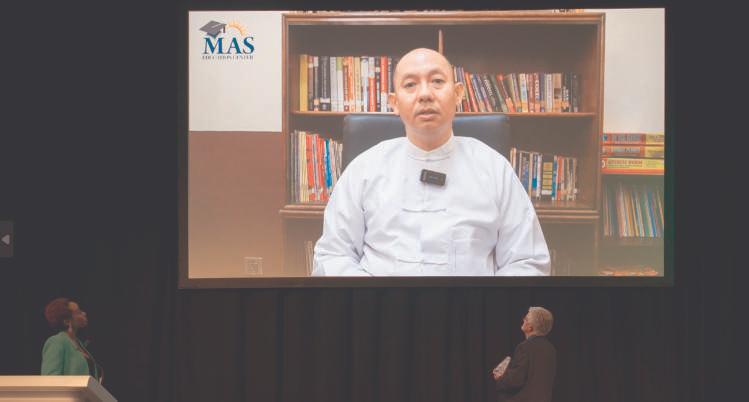
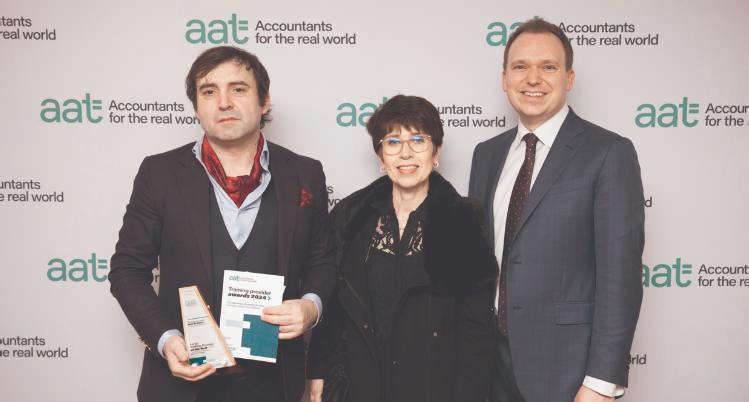
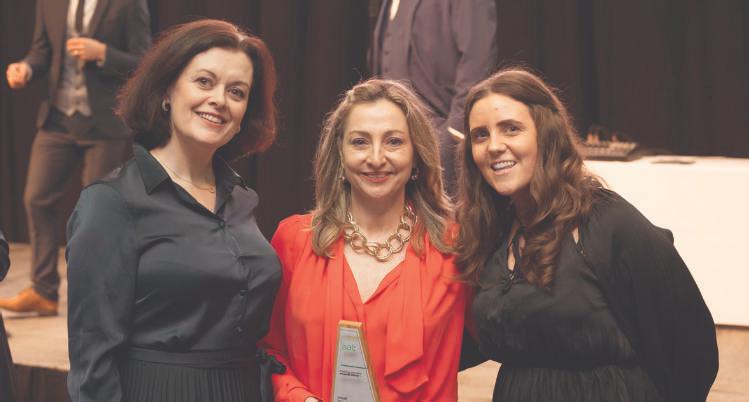


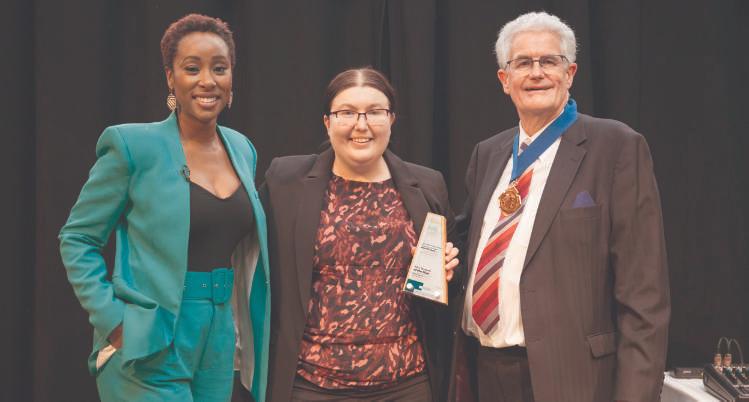

PQ 23 PQ Magazine May 2024 AAT Training Provider awards
3 Counties Accounts Training Services – best new training provider of the year
Time to wave your napkin in the air, like you just don't care
Future Connect Training & Recruitment – the medium training provider of the year
MAS Education: Management & Accountancy School (Myanmar) – international training provider of the year
New City College – the large training provider of the year
University of Gibraltar – the small training provider of the year
Riverside Training – apprenticeship training provider of the year
Karen Groves (e-Careers) – AAT tutor of the year
Katie Robinson (Training Link) – AAT student of the year
Premier Training – distance learning provider of the year
Meet the wonderful Katie Robinson
Katie was recently awarded Student of the Year by the AAT. Here, she tells her story…
Growing up, I didn’t know what I wanted to do once I had left school. Although school work came easy to me, no career path felt right. I feel that I took my A-Levels because I should do them rather than part of a grand plan. I opted not to go to university and instead fell into administration roles.
By late 2018, I was working as a Stock Administrator, but then two of my colleagues in the accounts team announced that they would be going on maternity leave within weeks of each other. My manager approached me with the idea of taking on some of the accounts work in that time, mainly costing work, as this would tie in with my main job.
It was during this time my manager suggested I do an AAT course to improve my knowledge. I took him up on this, and in June 2019 I registered with Training Link to do AAT Level 2 Accounting. I knew that I wanted to do distance learning so I could learn at my own pace.
Life can change in the blink of an eye
However, on Saturday 23 November 2019 – one week prior to my penultimate exam – life as I knew it changed forever.
My father was taken seriously ill in hospital having suffered a rare type of stroke. Previous thoughts of revising for an exam went towards learning complex medical terms and making three-hour round trips to visit my father in a specialist hospital. He had been my biggest cheerleader and I was going to return the favour by being there for as much of his care and therapy as possible.
Despite the poor outlook for my father’s condition, I eventually managed to sit my postponed exam in February 2020 and then focused on learning my final unit. I felt that I had a new purpose for completing my Level 2. In early March 2020, my father was placed into a nursing home and I got myself into a position where I was given the go-ahead to sit my final exam.
How the pandemic changed everything
I felt very much in limbo during this time as I had no idea when I could sit an exam and was not able to see my father due to the visiting restrictions for care homes. Nevertheless, I eventually passed AAT Level 2 with an overall mark of 98% (Distinction) in August 2020. That same week, I was also approved by the Court of Protection to be my father’s financial deputy (as
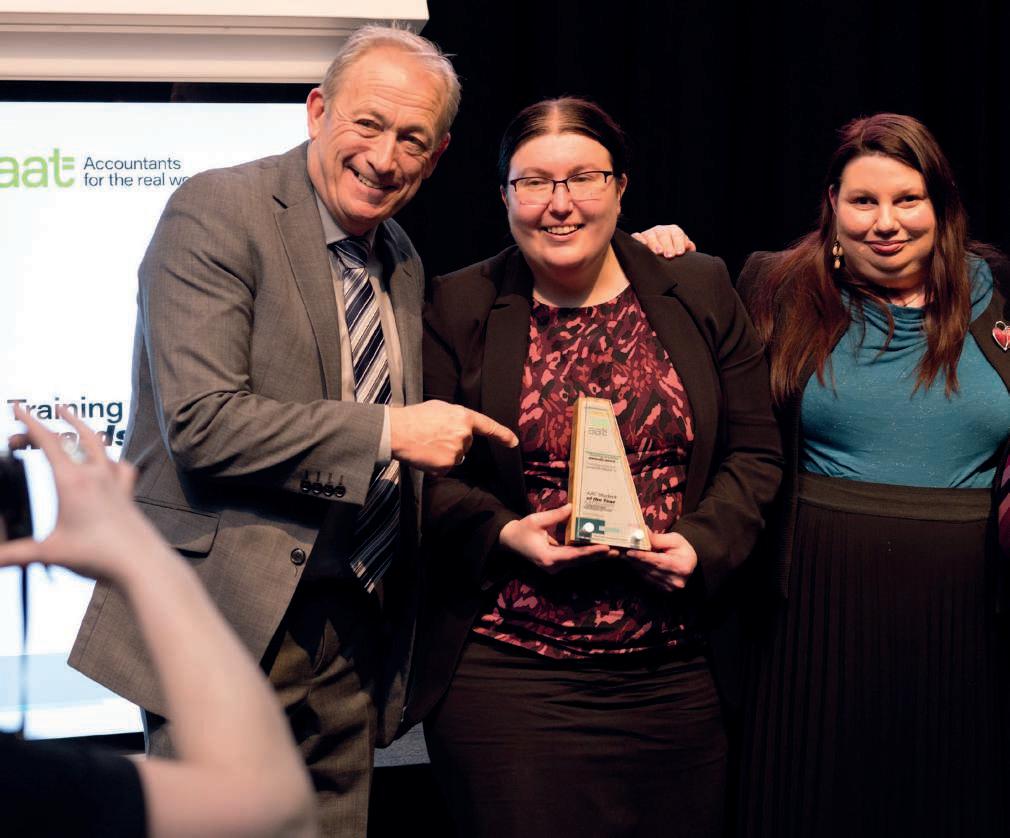
he had lost capacity before a Power of Attorney could be put in place).
The next year was spent getting my father’s affairs in order. But I found I was relishing in the challenge of ensuring that my father’s finances were properly recorded on the Office of the Public Guardian’s (OPG) system. For the first time, I was seriously thinking about making a career change from admin to accounts. Having seen my father struck down having barely retired, I wanted to make the most of my working life. I resolved to look for new employment once my personal life was more stable.
The start of a new chapter
In February 2022, I started applying for entrylevel accounts roles and I started my current employment that April as an Accounts Assistant. The company knew that I had experience of costings, but my general bookkeeping knowledge was minimal. That did not stop them from throwing me in at the deep end, but I felt that helped me learn at a faster rate. Before long, I was not only logging purchase invoices and reconciling the bank, but I was also moving on to
Get Started Today
Start your studies the same day - 24 hour online access with instant access to tutor support.
processing month-end journals, putting together cash forecasts, and liaising with customers and suppliers worldwide.
At the start of my employment I made a promise to my new manager that I would study AAT Level 3 Accounting. In September 2022, just after AAT launched their new syllabus, I signed up with Training Link again. Everything was as I remembered it and it made my learning experience a lot easier, even though the course was a lot harder than Level 2.
My initial goal had been to pass all four exams on the first attempt. Just over 12 months after signing up I was awarded an overall mark of 90% (Distinction), having indeed passed all four exams the first time.
What’s next?
My short-term aim is to start studying AAT Level 4 so I can take on even more responsibility in my job. Management accounting is what appeals most in the long term, but for now I am just embracing the chances I have been given and enjoying finding my way through my new career path.
Learning Resources
Award winning learning resources including printed books, eBooks & e-learning, videos and quizzes.
PQ 24 PQ Magazine May 2024 AAT Training Provider Conference
www.premiertraining.co.uk


Advance your career with an award-winning course or apprenticeship

Flexible, inspiring and engaging. Mindful Education courses are expertly designed to bring learning to life and achieve outstanding results.
Discover more mindful-education.co.uk/learners


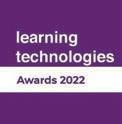
What is money laundering?
Have you got anti money laundering policies in place? If not, you need to make this your top priority!
Money laundering is a menace to businesses and society, costing the UK economy billions each year, according to the National Crime Agency.
Money laundering is a process whereby criminals turn the proceeds of crime into funds that appear lawful and can then be spent as if they were from legitimate sources.

As accountants we have a responsibility to act as gatekeepers and there is an unavoidable requirement to build anti-money laundering (AML) policies and procedures into our professional practice.
This is not just a nice to have, but rather a legally enforced requirement where you must demonstrate compliance with the regulations with your respective supervisory body. It may appear
to be another administrative burden, but with a disciplined approach and the support of your Institute the process needn’t be too difficult. AML is the responsibility, in some capacity, of all employees in a firm. If you spot something suspicious you should make an internal report to the money laundering reporting officer (MLRO) which then devolves you of your responsibility.
AML regs you must comply with In the accountancy sector, the regulations apply to those engaging in public practice by way of business, providing services such as tax compliance, bookkeeping, payroll, as well as accountancy and assurance services. Trust and company service provision such as
company formation and registered office services are also under the scope of the regulations.
Broadly speaking, accountancy firms must have in place appropriate tailored AML policies and procedures, a firm risk assessment of the clients and services it provides along with any steps to mitigate risks, conduct ongoing customer due diligence on all clients, including ‘know your client’ documentation and a client risk assessment, as well as ensuring relevant staff receive annual AML training.
Firms should also have clear reporting lines in place to enable you to make disclosures to the National Crime Agency, where appropriate. These are known as suspicious activity reports or SARs.
Keeping up-to-date
The Institute of Financial Accountants (IFA) has a team of knowledgeable, experienced AML reviewers and compliance officers who are on hand to guide their member firms through their AML responsibilities, queries, and AML reviews, but it is important to incorporate good practice before inspection becomes necessary.
On 21 May 2024 the IFA is holding its first AML conference online. This will be a great way to bring your understanding of AML up to date with insight from expert speakers and real-life case studies from practitioners.
Find out more and to book go to https://tinyurl.com/mnax7njj. Watch the YouTube video at https://tinyurl.com/53b8x6ny
• Thanks to the IFA for this article

26 PQ PQ Magazine May 2024 IFA spotlight
ACCA Careers is dedicated to helping ACCA students develop their careers. With hundreds of entry level global job opportunities and over 400 career advice articles, we’re here to help you every step of the way. Visit jobs.accaglobal.com today
Budgeting and variances explained
Karen Groves explains how to approach a budgeting and variance exam-style question and tests your knowledge on the subject
Budgeting and variances are assessed at AAT Levels 2, 3 and 4. At Level 2, only a basic level of knowledge is required; however, you will still be required to calculate variances and identify if these are adverse or favourable.
Budgeting helps a business to manage sales and costs and helps managers control the business. The budget is based on what you expect to happen in a future period, for example, next month. The budget is then compared with the actual amounts and any difference, or variance, can be investigated to identify the cause. For example, an increase in material cost could be due to a shortage nationally of materials, which in turn, has increased the purchase price.
A favourable variance occurs when our costs are lower than expected or our sales are higher than expected. A favourable variance will increase profits.
An adverse variance occurs when our costs are higher than expected or our sales are lower than expected. An adverse variance will decrease profits.
As an AAT tutor, I get many questions on how to calculate the variances, with students getting confused on which figures to base their calculations. We will look at an example question, and the way this should be approached.
Example
The following information has been provided for the month of April 2024, detailing budgeted and actual costs for the month:
Cost BudgetActualVarianceSignificant?
£££ Yes No
Direct materials33,58035,690
Direct labour 20,00021,500
Overheads 25,00025,000
Admin costs 12,00012,700
The first step is to calculate the variances as follows, being the difference between the budget amount and actual amount, for example:
Direct materials £33,580 - £35,690 = £2,110
Cost BudgetActualVarianceSignificant?
£££ Yes No
Direct materials33,58035,6902,110
Direct labour 20,00021,5001,500
Overheads 25,00025,0000
Admin costs 12,00012,700700
We are advised that any variance greater than 6% of budget is considered to be significant and should be investigated further.
The next step is to calculate the variance percentage, as follows, being the variance amount divided by budget x 100, for example:
Direct materials £2,110 ÷ £33,580 x 100 = 6.28%
Direct labour £1,500 ÷ £20,000 x 100 = 7.5%
Overheads – 0%
Admin costs £700 ÷ £12,000 x 100 = 5.83% Cost BudgetActualVarianceSignificant? £££ Yes No Direct materials33,58035,6902,110√ Direct labour
25,00025,0000 √
Admin costs12,00012,700700 √

Note: In an exam question you may also be asked to show the percentage variance as calculated above, so be sure to take the variance amount and divide by the budget amount.
Now have a go!
The following information has been provided for the month of May 2024, detailing budgeted and actual costs for the month. Any variance greater than 5% is deemed as significant and should be investigated further.
Calculate the variances and identify if the variances are significant or not.
Answers:
Direct materials £46,270 - £42,560 = £3,710
Direct labour £30,000 - £29,000 = £1,000
Overheads £20,000 - £24,000 = £4,000
Admin costs £15,000 - £15,500 = £500
Direct materials £3,710 ÷ £46,270 x 100 = 8.02%
Direct labour £1,000 ÷ £30,000 x 100 = 3.33%
Overheads £4,000 ÷ £20,000 x 100 = 20%
Admin costs £500 ÷ £15,000 x 100 = 3.33%
• Karen Groves is an AAT tutor and AAT Faculty Director at e-Careers
PQ 27 PQ Magazine May 2024 AAT exams
20,00021,5001,500√ Overheads
Cost BudgetActualVarianceSignificant?
Yes No Direct materials46,27042,560 Direct labour 30,00029,000 Overheads 20,00024,000 Admin costs 15,00016,500
£££
Cost BudgetActualVarianceSignificant? £££ Yes No Direct materials46,27042,560 3,710√ Direct labour 30,00029,000 1,000 √ Overheads 20,00024,000 4,000√ Admin costs 15,00015,500 500 √
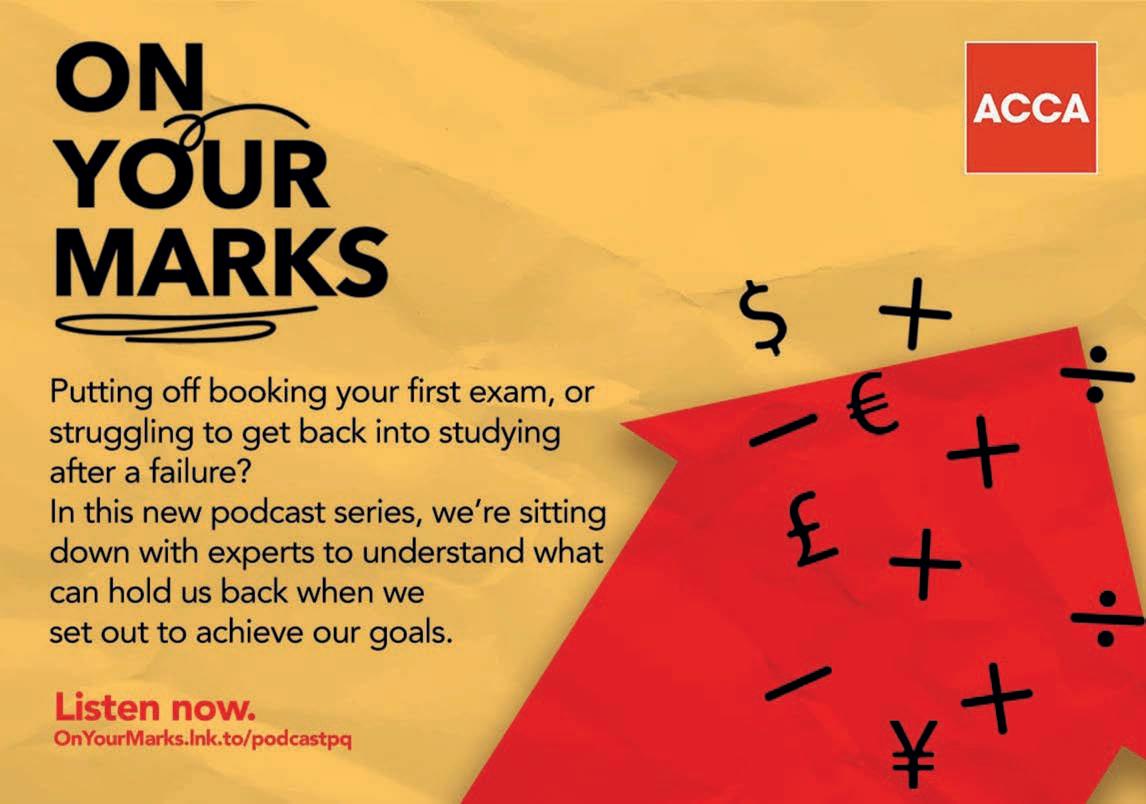

FIN A COURSE


Save time to find your next accountancy course with PQ Coursefinder.
Go to www.pqmagazine and click on the COURSEFINDER bar.
Find a course with a top provider that ticks all your boxes. Save money. Save time. Use PQ magazine’s Coursefinder.
we are on your side
A question for Tom
Tom Clendon explains the difference between a subsidiary and an associate – it’s all about control
Question
What’s the difference between a subsidiary and an associate?
Tom’s answer
Understanding the difference between a subsidiary and associate is important. You need to know how they are each accounted for in the groups accounts, but also to be able to apply their definitions in classifying investments.
Define the terms!
A subsidiary is an entity controlled by another entity, known as the parent company. Control means having the power to direct the operating and financial activities, having exposure to variable returns by owning shares in the company and having the ability to exercise that power. Control is normally evidenced by the parent holding a majority of the shares.
An associate undertaking is an entity over which the investor has significant influence but not control. Significant influence is presumed when the investor holds in excess of 20% of the equity but not a majority. Good evidence of significant influence is having board representation.
It is important to note that the definition of a subsidiary and an associate is not strictly speaking a numerical one. What matters is whether there is control or significant influence. And this can be a matter of judgement.
Accounting Subsidiaries are aggregated with the parent
company’s financial statements using acquisition accounting to produce the group accounts. Goodwill will arise. All assets, liabilities, income, and expenses of the subsidiary are combined with those of the parent company to form the group accounts. To

the extent that the parent does not hold all the equity of the subsidiary then a noncontrolling interest is recognised.
The rationale behind the full consolidation of the subsidiary is stewardship. Group accounts ensure that there is a reporting on assets and liabilities that are under a single control and the performance that those net assets generate. Through consolidation, the parent company effectively presents itself and its subsidiaries as a single economic entity. This reflects the economic reality. Associate undertakings are accounted for using the equity method. Under this method, the investor initially records the investment in the associate at cost and subsequently adjusts it to reflect its share of the associate's profits or losses and any distributions received.
Consider Kirk owns 40% of the equity of Spock. The other shareholders of Spock are owned by a large number of investors who are not connected and each own less than 1%. There are three directors of Spock and two of these were nominated by Kirk. The issue is whether Spock should be classified and accounted for an associate or a subsidiary in the Kirk group accounts. There is a rebuttable assumption that a 40% holding would give significant influence and therefore associate status. However, when the size and the dispersion of the other shareholders are considered together with the composition of the board the correct conclusion is that Kirk controls Spock. Spock is therefore a subsidiary of the Kirk group and should be fully consolidated using acquisition accounting. The NCI will be 60%.
Strange but true!
• Tom Clendon is an ACCA SBR online lecturer and podcaster who loves WhatsApp –07725 350793
PQ 29 PQ Magazine May 2024 company law
Saddle up for the latest pre-seen
CIMA’s latest pre-seen is here for the OCS, so saddle up as tutor Andrew Mower picks out the key examinable topics from Kanann

Kanann is a company that designs, manufactures and sells saddles for horse riding. The company is based in Keeland, a country in mainland Europe.
Kanann has a well-established brand and reputation for high-quality, value-for-money saddles, but lacks innovation, which had led them to ‘falling behind the times’.
So, what topics could be examined?
Core Activity A
Activity based costing (ABC)
Kanann currently uses a standard absorption costing system, with a single overhead absorption rate based on labour hours.
Although the product range is not currently complex, there is potential for Kanann to launch new specialist saddles. Fixed costs are significant within the business, so a more accurate costing system such as ABC could be tested.
Revise the key differences between ABC and absorption costing, and the pros and cons of switching. Both are commonly examined in OCS.
Core Activity B
Stress-testing budgets
Kanann’s budgets rely on several factors
running smoothly in order for them to be accurate for 2024 – including sales, material costs and production rates.
You may be asked to discuss stress-testing the budgets – what could change that would affect the budgeted figures?
Major disruptions for Kanann could include the loss of a major retailer, an issue with a key supplier, or staff illness.
Stress testing would then involve predicting these scenarios, and seeing how budgets would be affected. Know how this could work in this scenario.
Core Activity C KPIs and Variances
This is the most predictable one – KPIs and variances come up in nearly every OCS exam.
The pre-seen doesn't give us any KPIs for Kanann, so you may be asked to discuss suggested KPIs presented to you, or generate some brand new KPIs.
The key with these is to ensure they are SMART (specific, measurable, attainable, relevant and time-bound), and also justify why they are important to Kanann. This could link to the lack of innovation, sustainability targets
or new saddle ranges, for example.
You often get given a variance report, so be prepared to explain what the variances mean, and discuss what could have caused them.
The most important tip with variances is to relate them to the scenario given – the answers will often be in the question, so use that to support your points.
Core Activity D PPE and Leases
Kanann is looking to become more innovative and sustainable, and the average time to produce a saddle is a massive 28 hours.
It would make sense to invest in new, innovative manufacturing equipment to help make saddles faster and in a more energyefficient way.
This would involve knowing which costs to recognise initially under IAS16, and then how to depreciate the assets and deal with any subsequent expenditure.
Given Kanann doesn’t have huge amounts of cash, an alternative could be to lease assets instead, to avoid the upfront costs and allow them to update the equipment more frequently to stay innovative in future years.
Kanann doesn't lease any assets currently, so you could be asked to explain right of use assets and lease liabilities under IFRS16.
Core Activity E
Expected Values
There are several clues that Kanann will launch a new saddle range soon, potentially focusing on specialist saddles rather than just their existing general purpose models.
If this happens, Kanann will want to forecast demand – and how this would be affected by different marketing campaigns or by differing states of the economy in Keeland.
Know how to explain expected values, potentially as part of a decision tree. Other statistical tools such as standard deviation and coefficient of variation could also be tested.
Remember, if the examiner asks for a recommendation, make sure you do one, or you will slip down in the marking grid and throw away several easy marks.
Core Activity F
Inventory Management
Kanann holds a reasonably high level of inventory (K$590,000 at 31st December 2023), which we are told is very labourintensive to manage in the warehouse.
Inventory days have dropped from 64 in 2022 to 56 in 2023, which could suggest Kanann has already started the process of becoming more lean with their inventory levels.
A move to a Just in Time (JIT) system, or introducing the use of Economic Order Quantity (EOQ) could be suggested. Revise how each of these systems works, and the benefits and drawbacks of adopting each approach – including the assumptions behind EOQ.
• Andrew Mower has just launched a brand new online course for OCS, available now at vivatuition.com. You can also follow him on LinkedIn for exam tips and more
30 PQ PQ Magazine May 2024 CIMA OCS
Beyond the numbers
Steve Chen explains how to pick up the easy marks in the discussion part of the AFM exam
Throughout my years of experience teaching the ACCA Advanced Financial Management exam, being an official marker for the largest accountancy body in the world, and being the official exam marker at ICAS, I’d like to share some tips regarding how to pass this paper.
There are two vital things to bear in mind:
1. Understand your role – to present analysis to the board rather than simply jumping to the conclusion.
2. Work hard on the discussion requirements.
Calculative and discussion requirements
Calculation in the AFM exam seems to be difficult for many students; however, the discussion requirements usually contain many easy marks. Examples:
• Comment on or discuss additional matters to consider when making investment decisions.
• Comment on or discuss the factors to consider when considering potential financial options.
A weak answer tends to focus on:
• Appropriateness of the current company’s strategy, such as commenting on whether it should leave this industry.
• Whether the company should proceed with the decision, such as by advising the board not to proceed with the investment.
• Appropriateness of the current financial decision, such as simply advising the board not to go ahead with the debt finance option.
Misinterpretation
The student answers mentioned previously completely misinterpret the AFM exam’s requirements. These types of answers usually do not earn any marks because the questions are designed to assess the students' ability to demonstrate critical thinking, not simply to arrive at a conclusion.

Therefore, I would highly recommend my students follow the below approach to answer the discussion requirements in the AFM exam. Example of requirement: Discuss the factors to consider when making investment decisions.
Your answer could include:
• Calculation: Make sure you comment on the calculation. It is highly likely that Analysis and Evaluation professional marks will be awarded.
• Cash flows: Comments regarding the potential investment options should be from a cash flow's perspective; indeed, this is the key element of the AFM syllabus. Things to mention could include sensitivity analysis, option value analysis, and simulation analysis.
• Pros and cons: If you are given more technical areas, such as ways to finance the

business, make sure you also comment on the pros and cons of each method.
Writing style
Unlike in other SP-level papers, the writing style of the AFM exam questions should adopt ‘the simple sentence’ approach. There is no need to further expand the answer if the point is touched on in the answer. I would teach my students to use the ‘Point + So what’ style in the discussion question.
It’s important to note that the AFM exam does not allow for partial marks; that is, there are no half marks in the discussion requirements. Each discussive point made can earn one full mark or none at all, depending on the marker’s assessment of the explanation’s clarity.
• Steve Chen, FCCA, ACA, is the founder at GlobalAPC and an exam marker for two professional accountancy bodies
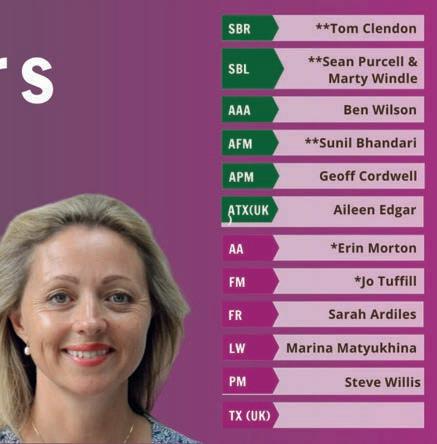
PQ 31 PQ Magazine May 2024 ACCA AFM exam
Embracing that dreaded topic
Nasheen Wuisman explains how you can gain understanding of the subjects that, initially, cause you real headaches
You read it once, it doesn’t make sense… you read it again, still no sense. You have now read it multiple times and other than getting frustrated you have not moved on!
Sound familiar? It should. I felt like this about Statements of Cash Flow when I was studying. I couldn’t see how or why or even what the point was. This wasn’t the only topic that caused my exasperation when I was studying – but I will spare you the list.
Every subject you face has areas that are logical and straightforward. However, every subject also has topics that can stop you in your tracks; you can’t get past them and you just don’t know how to move forward. It can feel like if you don’t understand this one topic you are not going to be successful in the exam. Let’s look at the bigger picture first. Every subject is balanced – even the subject you dislike the most (there might be more than one) is balanced. There are straight forward topics and there are hard ones, it is the nature of the syllabus. So don’t panic, everyone is with you.
What we need to do is to be able to move on, see past it, get the essential information from it to progress. So what do we do? Rather than let the problem fester, try some of these techniques to work through it.
Identify your bugbears in advance
Doing this means you have time to be in control and plan to tackle it head on. Realising you have a problem topic two weeks before the case study exam limits your options and will cause unnecessary stress. So plan your exam preparation time well in advance, allow time for hurdles and contingency and then try your best to stick to the plan.
Go with the flow
Work through the topic, accept it is hard and spend a little longer on it on the second read. Try to keep an open mind, as there will be elements that do make sense, usually the

foundation. Once you feel a little confident then tackle the trickier elements.
Come back to it
The worst thing you can do is get caught up with a tough topic and then allow it to stop you from progressing. Whether you are preparing for a case study exam, objective test or working through the Finance Leadership Programme competencies, remember that you can always leave a topic for now and come back to it later.
Firstly, this allows you to move forward and complete more of the level you are studying for, which will give you a psychological boost; furthering your general subject knowledge may even shed more light on the topic you were stuck on. Secondly, it means one tough topic doesn’t become an overwhelming barrier in your head. This emotion can make you
question whether the CGMA qualification is even for you, whether giving up is the answer… but you’d be wrong! Everyone who has studied CIMA has experienced these emotions. So leave it, move on, come back to it later – this topic is not going to stop you.
Find a tangible example
Worked examples to support theoretical explanations help your brain to visualise the concept and can enhance your learning, even with complex or abstract concepts.
For this reason, try to seek out worked examples of the topic you are struggling with. You never know when you will find the one which makes the concept ‘click’ in your head.
Vary your learning source
When you get stuck, and realise that a topic is vexing, the temptation can be to go over the same page in a textbook or FLP module again and again until you get it.
After a while this becomes counterproductive. Instead, take a break, then try to find another source that explains the same concept. Is there a video on YouTube that can help? Maybe a podcast? Just hearing the same thing explained in a different way or by somebody new might help you make the connections you have been missing. Check out the key topic support on the CGMA Study Hub, which focuses on tricky topics. You might just find exactly what you need.
The power of revisited learning
In order to be topic comfortable or even confident, remember to come back to it. Revisiting what you have learned over time boosts your brain’s capacity to store and retrieve the information. Giving time for learning to settle allows the perfect environment for storing information, as well as recalling it.
Ask any CGMA designation holder and they will tell how they did not need to be confident in every topic in every subject syllabus. They will tell you how even when they came across hard topics in the exam, the ones they feared all along, they still passed. They will tell you to be as comfortable as you can be with as many topics as possible, and they will tell you that now they are qualified they are relieved that they’ll never have to be examined on that dreaded topic again!
• Nasheen Wuisman, Senior Manager of Global Academic Progression at AICPA & CIMA, together as the Association of International Certified Professional Accountants

32 PQ PQ Magazine May 2024 CIMA spotlight

Fostering financial resilience in a chaotic climate
Jennifer Bevan looks at how local authorities can balance the books as funding pressure increase and demand for statutory services continues to grow
Safeguarding sustainable service delivery for future generations demands robust financial resilience. But what does this look like amid the frenzied financial landscape that local government finds itself in?
Since the 2008 financial crash, financial resilience has undoubtedly become increasingly pertinent,yet more and more challenging for authorities to achieve. Financial resilience refers to the ability to respond to unexpected changes in demand or resource without placing the organisation at risk of future financial failure. With service demand pushing past the brink of workforce and funding supply, maintaining financial resilience is no mean feat in today’s climate.
A legislative function
In England and Wales, financial resilience is nevertheless tied to a legislative need. Local authorities must meet a balanced budget by law under the provisions of the Local Government Finance Act (1992). Existing as a buffer to prevent authorities from spending beyond their means, this legislation aims to foster a foundation for good
financial resilience. In practice, this looks like an ability to evenly match income with expenditure. In theory, this additionally involves fostering a sustainable and stable financial state over a longterm period.
While authorities are allowed to use reserves as part of their budget calculations, this resource can only be used once. Where reserves are used to plug revenue gaps, CIPFA advises that authorities maintain a sufficient level of reserves beyond this immediate activity. Otherwise, depleted reserves run the risk of unforeseen circumstances threatening financial stability.
Warning signs
To help stop financial instability in its tracks, there are key warning signs to watch out for among local authorities. Common risk areas include:
• Undelivered savings without a robust plan for delivery.
• Widening budget gaps, leading to unplanned overspends.
• Unchallenged increased risk appetites.
• Debt.
Financial struggle can be further identified by
a decrease in the tools and controls that help a local authority mitigate against financial risk. These factors include:
A rapid decline in reserves
• A shortened medium-term plan and lack of horizon scanning.
• Reduced capacity within teams. The combination of growing risk areas together with weakening resources to alleviate pressures concocts a perfect storm for financial instability. This can leave an organisation in a weak position to cope with peaks and troughs in demand, or unexpected occurrences of one-off expenditure.
Fostering financial resilience
CIPFA’s work in examining the warning signs of financial instability reveals underlying themes and causes that can help authorities to pinpoint their risk areas. These financial risk pressures include: High levels of debt and risk: A shifting focus on income generation sees some authorities enter commercial strategies, sometimes leading to greater than expected levels of risk for the local government organisation. This high level of risk exposure can result in commercial strategy failure, and an unsustainable level of debt compounded by a lack of financial return to manage it.
Legacy issues: In some circumstances, financial issues arise from historical costs that have run riot. An example of insufficiently controlled costs lies with Birmingham City Council, where pressures arose from historic equal pay claims and issues with the installation of a new IT system. Broad pressures: A low council tax strategy or a lack of direction for delivering savings can build up broader pressures that threaten financial resilience.
Governance and scrutiny: As financial sustainability becomes increasingly challenging, it is essential to maintain strong leadership coupled with good financial management. This demands transparent and honest monitoring of reports to allow financial issues to be both identified early and acted upon in good time. In additional, strong governance arrangements include the ability to speak truth to power. Where authorities experience financial difficulties, there can be issues concerning a lack of oversight from audit and governance committees. It is important for governance teams to exercise their functions effectively and to maintain a strong understanding their roles and responsibilities.
Recognising these issues and reflecting upon lessons learned can enhance a local authority’s ability to foster financial resilience for the future. CIPFA has further responded to discussions surrounding financial resilience by recently updating the Treasury Management Codes and Prudential Borrowing Codes to tighten requirements, with a further review to take place in 2024.
Following a frugal Spring Budget for public service funding, and as we look ahead to the preelection whirlwind, it is increasingly important for local authorities to get financial resilience right. Start scrutinising risk areas and resources now to place yourself in the best possible position to deal with the ever-increasing demand amid our frenzied financial climate.
• Jennifer Bevan is an Advisor for CIPFA’s Financial Advisory Network
34 PQ PQ Magazine May 2024 CIPFA spotlight
Dear Karen
Ask PQ’s very own agony aunt Karen Young when you need advice from a real expert. Email your dilemma to graham@ pqmagazine.com, and he will pass on the best ones to Karen
THE DILEMMA
I’ve been told different things about whether to include my hobbies on my CV. Do you think it’s a good idea?

KAREN’S RESPONSE
Many CV templates have space to mention your personal interests and hobbies, such as creative pursuits, sports or volunteering. While you want to paint a picture of who you are as a person, so an employer can assess whether you’d be a good fit for the team, it’s important to reflect on how relevant your hobbies may be to the job you’re applying for.
It is worthwhile highlighting hobbies that illustrate your transferable skills, whether that’s working well with other people in a team sport or having strong technical skills from online gaming. Think about the hobbies that demonstrate and enhance your problem-solving, communication and project management skills to really impress your prospective employer.
Hobbies can illustrate the personality traits that will help to depict you as a suitable candidate for the role in question. So consider whether you would be comfortable speaking about your hobbies in an interview, then make sure you tailor that section accordingly.
If you have space towards the end of your CV, and you have come to the conclusion that they are relevant, appropriate and interesting, there’s no harm in including your hobbies. Keep any mention of your personal interests brief, as the bulk of your CV should reflect your experience and transferable skills and your studies and qualifications, and you want your CV to be eye-catching and concise.
• Karen Young is a director at Hays. She is passionate about helping people to find the right job and companies the right person
How do organisations say sorry?
Making it easier for organisations to apologies could give victims more chance to find closure, says a new consultation
The UK government is looking to update the law to make it easier for organisations to offer sincere apologies to those who have been wronged.
The Compensation Act, which became law in 2006, made it easier for public institutions, private companies and their employees to apologise, without admitting liability in civil proceedings.

with their lives.
Yet almost 20 years on, there is little evidence this has encouraged businesses to use apologies more as form of reparation – leaving many victims without proper closure and a sense they are unable to move on
In brief
New flexible working laws
The UK government’s new flexible working regulations have now come into force, giving employees the right to request flexible working arrangements from the first day they are employed.
Under the old laws workers had to employed for 26 weeks before they could ask to work more flexibly. The changes mean staff can now ask to go parttime, have flexi-time, term-time working, compressed hours, and even adjust their start and finish times, as well as ask for the right to work from home.
And before rejecting any such requests employers will now need to consult with the
Often, organisations and individuals remain reluctant to apologise because of concerns it may be interpreted by the aggrieved party, or insurers, as an admission of fault. Changing the law to make this clearer could remove barriers – perceived or real – to apologising, while
broadening the scope of the law would allow people to express regret and offer more earnest apologies.
As part of the consultation, ministers are also considering how best to refine current laws following a recommendation from the Independent Inquiry into Child Sexual Abuse (IICSA) that apologies could and should be offered by employers for the actions of current or former employees – known as vicarious liability. This would encourage the likes of schools, care facilities or hospitals to offer apologies for abuse carried out by an individual at these institutions.
employee. Employees will also be able to make two requests every year.
If want promotion don’t work from home
Men who work entirely from home are more likely than women to be passed over for promotions and pay rises compared with their male colleagues in the office, says new research.
A study by the University of Warsaw’s Agnieszka Kasperska found UK bosses were 15% less likely to promote men who worked from home than their office-based peers, and 10% less likely to see a pay increase.
They are also much less likely
than their female colleagues to be overlooked, with bosses saying they were 7% less likely to promote home-working women than those in the office and 8% less likely to give pay rises.
Failures over the national minimum wage
As the national minimum wage reaches its 25th anniversary, there continues to be a high level of noncompliance among employers, warns BDO.
Since the introduction of the national minimum wage in 1999, HMRC has carried out 87,000 investigations, issued £86m in fines and enforced £117m of arrears.
The PQ Book Club: books you should read
Career Confidence: No-BS Stories & Strategies for Finding Your Power by Robynn Storey (Wiley £23.99)
Robynn Storey is the CEO of Storeyline Resumes, so right away from that word ‘resumes’ you know that we are listening to an American voice, but it is a voice worth listening to nevertheless.
Over two decades Storey has helped more than 300,000 people find their dream job, employs 60-plus staff and brought in $10 million in revenue. So fair to say she knows what she is talking about.
Chapter 1 is called ‘Life’s a gamble’ and the take away is don’t be afraid to bet on yourself. As she says: “I am suggesting that taking a chance, in life, in work, in relationships often leads to the greatest wins of all.”
And, like all the chapters in her book, it is short and sweet – but that works. Some of the chapter titles also brought a smile! Like ‘Want loyalty? Get a Dog’, ‘Fake it ’Til You Make It’, and ‘A Guy Walks into a bar’. In that last chapter the author stresses the importance of always being on the lookout for new friends, new connections
and new opportunities. People are always landing jobs because they talked to someone in a lift, plane or even a bar.
PQ rating: 5/5 What this really readable tome gives you is a sense of how important it is to do something you love. She says everyone deserves to find the right fit and wake up feeling excited to get to work. Without that you can’t flourish.

PQ 35 PQ Magazine May 2024
PQ
careers

Senegal elects tax collector as president
A year ago no one knew who Bassirou Diomaye Faye was. Now, the former tax collector has become Africa’s youngest elected president. He became Senegal’s new president in late March, after spending 11 months in jail with his ally Ousmane Sonko (also a tax collector, now the country’s Prime Minister). Faye has the nickname ‘Mr Clean’, and has just turned 44. Top of the agenda now is the fight against corruption, injustice and poverty.
He is looking to renegotiate gas, oil, fishing and defence deals so they benefit the Senegalese people. He also wants to create a new currency, and move away from the current set-up where the currency linked to the Euro.
Don’t get fooled again

In the past, PQ magazine would have been there on 1 April with its April Fools’ Day prank. We caused an outcry when we said PQs would have to wear their suits to the exam hall because the professional bodies said they looked too scruffy and were bringing the profession into disrepute! The accountancy bodies were inundated with complaints, and we had to buy the receptionist at CIMA flowers to say sorry for giving her such a terrible day. Now we
Your favourite accounting jokes
Here’s our top 10, in no particular order:
Why are accountants so cool, calm, and collected? They have strong internal controls.
How many accountants does it take to screw in a lightbulb? How many did it take last year?
What do you call an accountant without a spreadsheet? Lost. What do you call an accountant with an opinion? An auditor.

What does an accountant say when getting on a train? Mind the GAAP.
Why do you always get a good welcome when you visit the accounting department? Because

it’s a place where everyone counts!
What do you call an accountant without a calculator? Lonely.
How does Santa’s accountant value his sleigh? The Net Present Value (too early?).
What do accountants suffer from that ordinary people don’t? Depreciation.
Why do accountants seem to lead a happy life? Because they are able to achieve balance most of the time.
Thanks to LHH and Taxdome for these. If you have a better one please send it to graham@pqmagazine. com
When you need a photographer…
After an absence of four years the AAT Training Provider Awards and conference came back with a bang in Nottingham. The entertainment for the awards night was supplied by a special delivery pizza man (and his friend)! The pizza was delivered to FI’s Nick Craggs, who appeared to have stolen one of colleagues Gareth John’s shirts. It all ended happily, as the pizza guy turned out to be a fantastic singer (but we knew that was coming).
PQ magazine was there, of course, and it was great to see CEO Sarah Beale seems to be able to turn her hand to everything. She even helped out with the photos. For the record, there was also a professional photographer on hand, too.
leave it to others to have the fun.
For his April Fool, top tutor Sunil Bhandari explained he had signed up for revolutionary right knee replacement surgery (his left has been replaced by a more traditional method). It would mean connecting his knee to a power source every day, and would cut his recovery time in half. Didn’t sound that far-fetched to us!
Meanwhile, Tom Clendon claimed accounting students were going to be allowed to use the internet (including AI’s ChatGPT) in a forthcoming special exam. A nice touch in his story was the link to those wanting to know more –https://lnkd.in/dmHmFp9. Again, that April Fool may become a reality one day.
Smoking costs
Smoking is not good for your health, we all know that, but did you know how much you could save by not smoking? Well, online vape retailer Go Smoke Free has worked it out. It found a 20-year-old woman on 10 fags a day could save £163,702.50 over her lifetime if they quit smoking! That has been worked out on a pack of 20 cigarettes costing £13. Because men don’t have such a long life expectancy, a 20-year-old man would only save £156,585. Middle-aged people were also revealed to have significant potential savings from going smoke-free. A 50-year-old woman had potential lifetime savings of £87,782.50, if she lived the expected 37 remaining years.
Amazing animals

We have three copies of Amazing Animals up for grabs this month. The wonderful animal designs in this book will allow you to break away from the chaos of everyday life and plunge yourself into a land of peace and relaxation. All the illustrations are drawn by hand and the models are real animals.
To be in the draw to win one of these books send an email headed ‘Amazing Animals’ to giveaways@pqmagazine.com, along with your name and address.
Fiendish Su Doku
We have three copies of The Times Fiendish Su Doku Book 10 best-seller to give away this month. You can immerse yourself in 200 of the most super fiendish puzzles. Remember, these aren’t just fiendish puzzles these are super fiendish ones!
The claim is that these Su Dokus will be enough to exercise the grey matter of even the most experienced enthusiast. To be in with a chance to win one of these fab books simply email us at giveaways@pqmagazine.com with your name and address and we will put you in the hat. Head up your email ‘Su Doku number 10’

36 PQ Magazine May 2024
W E V E G O T T H E L O T ’
Terms and conditions: One entry per giveaway please. You must send your name and address to be entered for the draw. All giveaway entries must be received by Friday 17 May 2024. The main draw will take place on Monday 20 May 2024. TO ENTER THESE GIVEAWAYS EMAIL GIVEAWAYS@PQMAGAZINE.COM PQ the got a story, funny or serious, you want to share? Email graham@pqmagazine.com
























































































































































































